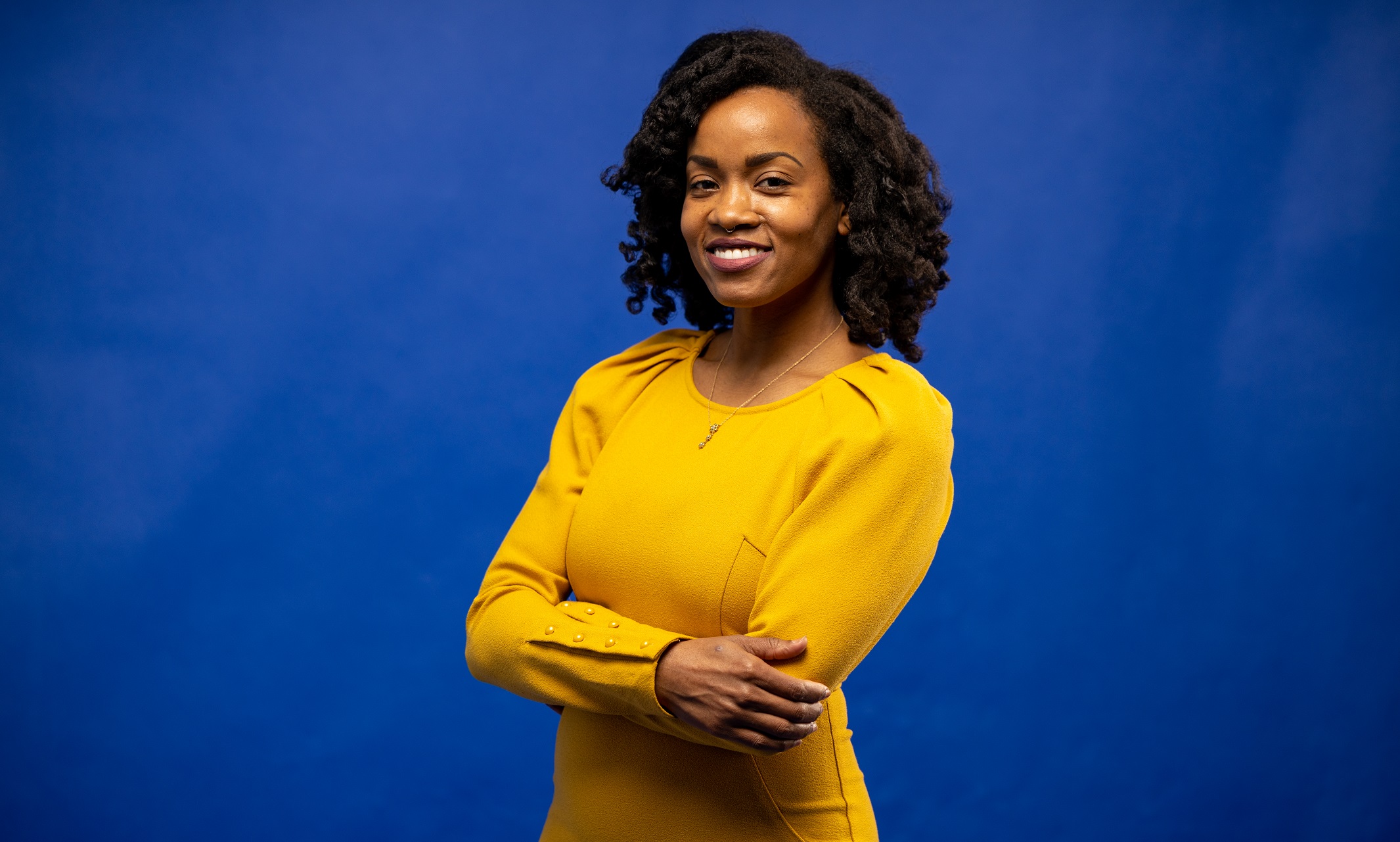
Aishah Augusta-Parham, Ph.D., receives start-up funding for new digital tool, SEPOW
During the summer of 2016 as Aishah Augusta-Parham, Ph.D. studied counseling and psychology, she experienced instances of prejudice in some of the businesses she frequented.
Despite a broader social awareness around equity, her personal experiences were proof that some systems that had not changed.
“I began realizing that as a psychologist, I could help individuals by targeting their specific symptoms, but when they left my office, I wouldn’t be able to impact those systems.”
Augusta-Parham, Ph.D. (B.A. '06, B.A. '08) decided that in order to be truly effective, she needed to target the systems as well as the undesirable experiences those systems were creating for some people. That is how SEPOW was born.
“SEPOW is the Yelp for diversity, equity and inclusion,” she says. “In the same way Yelp allows its users to rate their experiences, SEPOW will enable employees to rate their experiences at a business or company in relation to race, ethnicity, gender identity and expression, religion and sexual orientation – all on the app.”
Organizations will be able to see their ratings and select customized solutions that SEPOW can provide to address the specific experiences of their employees.
“Organizations will have real-time feedback on their multicultural initiatives, and see specifically what's working and what’s not working,” Augusta-Parham says. “They can have accurate information on race-related stress and how it’s impacting performance, morale and engagement with coworkers and employees.”
Augusta-Parham received support from Digital Sandbox, which provides start-ups with feedback and funding to accelerate their businesses. She says this has been instrumental to SEPOW’s growth and development.
“Now organizations will have real-time feedback on their multicultural initiatives. They can see specifically what's working and what’s not working.” — Aishah Augusta-Parham
“It’s really important for a founder to get out to the market as quickly as possible to accelerate towards commercialization,” Augusta-Parham says
Through networking, Augusta-Parham connected with an effective mentor. When she reached out to Bryan Shannon (B.A. ’04), who is an entrepreneur, he was impressed by her commitment and domain experience. He realized she was up to the challenge of getting her start up-to market.
“Aishah is the type of individual who looks for a pathway forward,” Shannon says. “SEPOW is attempting to fill a void that exists in a very sizable market.”
Augusta-Parham is working hard now, but she has even bigger plans for the future.
“Five years from now I want SEPOW to be the hallmark for diversity, equity and inclusion,” she says. “My goal is for employees to feel heard, supported and empowered, and for organizations to have the resources to help them move the needle on multicultural initiatives. ”
Start-up funding has been critical to her launch.
“Without Digital Sandbox, I wouldn't have this opportunity to move as quickly as I possibly can and get off the ground.”
Feb 25, 2022
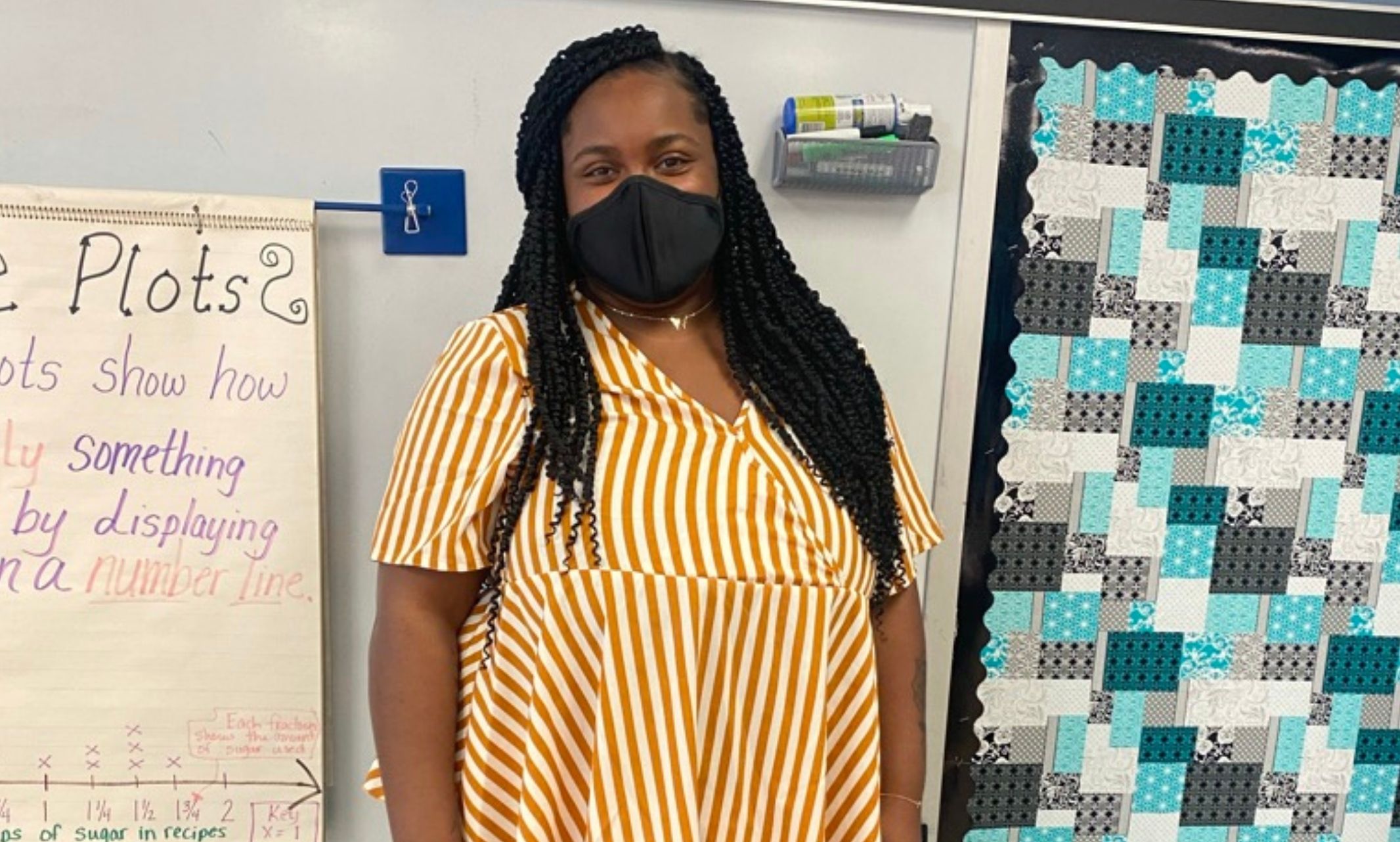
Student-teachers learn how to manage their own classrooms, even in a pandemic
Student-teaching is the final year of school for education students, and it’s filled with challenges and new experiences. How does a global pandemic factor in?
We spoke with three UMKC students who are student-teaching in greater Kansas City about how they’ve made the transition from student to teacher.
Where are you currently student teaching?
Lea Johnson: I am at East High School in the Kansas City Public School District (KCPS).
LeXaibriar (Xai) Brooks: I am currently student teaching in the KCPS School District at J.A. Rogers Elementary School.
Zane Green: I am student teaching in the Guadalupe Center Charter School, specifically the high school (GCHS).
Why did you decide to become a teacher?
Johnson: Our communities and students have complex cultural identities, which aren’t always served well. I want to develop the identities of my students and myself and work together to ensure that all young people receive the same quality of education, resources and opportunities so that they may pursue their dreams.
Brooks: I always knew I wanted to be a teacher. I was very active in church, and I would sometimes tutor. I was always helping someone write a paper or looking over their work. I liked being able to help and use my knowledge for something good. I also learned firsthand how one good teacher can change the course of a life, and that’s who I wanted to be.
Green: I will be a third-generation teacher. My mother taught home economics in Grandview and Parkville South. Her father, my grandfather, taught middle school math in a small town in Southwest Iowa. I would like to teach high school civics and speech and debate. I had an amazing civics teacher who was awesome and always did his best to make lessons fun; it was obvious that he cared deeply about his students and the topics.
What is your favorite subject to teach?
Johnson: I have always had an innate desire to create and express myself through art. It enables me to understand and make sense of the world around me, and I’ve always wanted to find a spot to help others empower themselves through creativity. Education is my landing spot. The classroom is a special place that can teach students essential life skills, but it is also a place for students to learn about themselves, others and the world. Art is the medium where I am able to guide students through these developmental processes, enabling them to overcome barriers that might have seemed too tall to scale.
Brooks: My favorite subject to teach is definitely reading. I believe that there is a lot of power behind words and if you learn to use them in the right way, you’ll never be unheard or misunderstood.
Green: Government. In the practicum program, I have observed and taught U.S. history, world history, and sociology, but government has been the most fun. Civics classes allow for discussion and activities that include resemblances of what you would see in a speech and debate club.
Zane Green
Did Covid affect your student-teaching plans?
Johnson: Not really, KCPS has been in-person the whole year, but my cooperating teacher and I have had to re-structure some of our lessons to accommodate Covid-related restrictions and to allot extra time for everyone to clean our art supplies and disinfect tables between classes.
Brooks: Covid actually did not interfere with any of the plans that I had for student teaching. When I started my student teaching in August, everything went exactly as my cooperating teacher and I planned. We did have to plan a little more as far as seating goes, or how far apart the students had to be, but that’s about it.
Green: Absolutely! Despite getting vaccinated back in March and April, I got COVID the weekend before GCHS started. I missed the first two weeks of student teaching. I was finally able to go in, and then the fourth week of school my cooperating teacher tested positive so I spent the week with a substitute teacher.
Covid has been hard on schools, especially the Omicron variant. How have you noticed it impacting your school community? You?
Johnson: Overall, the community, students, teachers and support staff, seem overwhelmed. For me, it has been hard to get the students re-focused once they come back to school after being sick or caring for family. I have also had to be flexible with my lesson planning to allow more time for my students to catch up on their missing work. But the many teacher absences due to Covid have actually given me opportunities to substitute teach for my cooperating teacher and cover other classes, giving me lots of valuable experience in classroom management and in developing positive relationships with more students.
Brooks: Omicron has definitely impacted our school community. There are kids being pulled out of class for testing left and right, and teachers are sick and out of the building, which is also hard for our school community because of the substitute teacher shortage. As for me, just making sure to be safe and aware of my health, while also doing the things I’m there to do, is another job within itself.
Green: The last few days before winter break, we were missing 25% of the student body. The week of MLK day, we had closures Tuesday and Wednesday because too many students and staff had tested positive. For myself, it’s just a sinking feeling when I see I am going to be missing a student for 5-10 days. It is extremely disheartening and I’m left wondering how I catch all these kids up.
What has been your favorite part of student-teaching so far?
Johnson: Working together alongside my students to imagine, investigate, construct and reflect on the creative process.
Brooks: THE KIDS! Definitely. They are a constant reminder of what teaching means and why I chose this for myself. Even though I’m the teacher, they teach me every day how to be better as not only a teacher but a person.
Green: When students “get it.” GCHS has a large population of English Language Learners, so whenever I find the right way to explain or word something to them it is very gratifying.
Lea Johnson
What is something that’s challenged you, or that you didn’t expect?
Johnson: It’s been challenging to keep students off their phones and focused on completing their work during class. I knew cell phone addiction was a real thing, but now I have seen firsthand the negative impact it is having on our students’ academic performance.
Brooks: Oddly, the thing that has challenged me and the thing that I didn’t expect is the same thing: the relationships I have with the students. I didn’t expect that the students would have such an impact on me in such a short time, or that I would love them far beyond the classroom. This is also a challenge because oftentimes it’s hard to separate my life from theirs. I find myself wondering if they’re eating on weekends, sleeping well, etc.
Green: The amount of time it takes to lesson plan, grade and prepare for class and how little time I have to do all of it. It’s all a part of the process and student-teaching is a full-time job, but it is hard to balance everything.
What’s one word you would use to describe your teaching style?
Johnson: Warm-demander. I have a nurturing personality and developing positive relationships with my students comes easily to me, but I also have high expectations for my students and push them to work hard and create something they are proud of.
Brooks: Free. I know that there are certain things that have to be taught and things that have to be done, but even with that there are ways to venture out and do things in a way that interests you and your students.
Green: Flexible. I do my best not to talk at the board for more than five minutes at a time if I am giving direct instruction. I prefer to have students learn independently, with a partner or a small group. Teenagers don’t really want to listen to me, but they might listen to their peers.
Feb 25, 2022
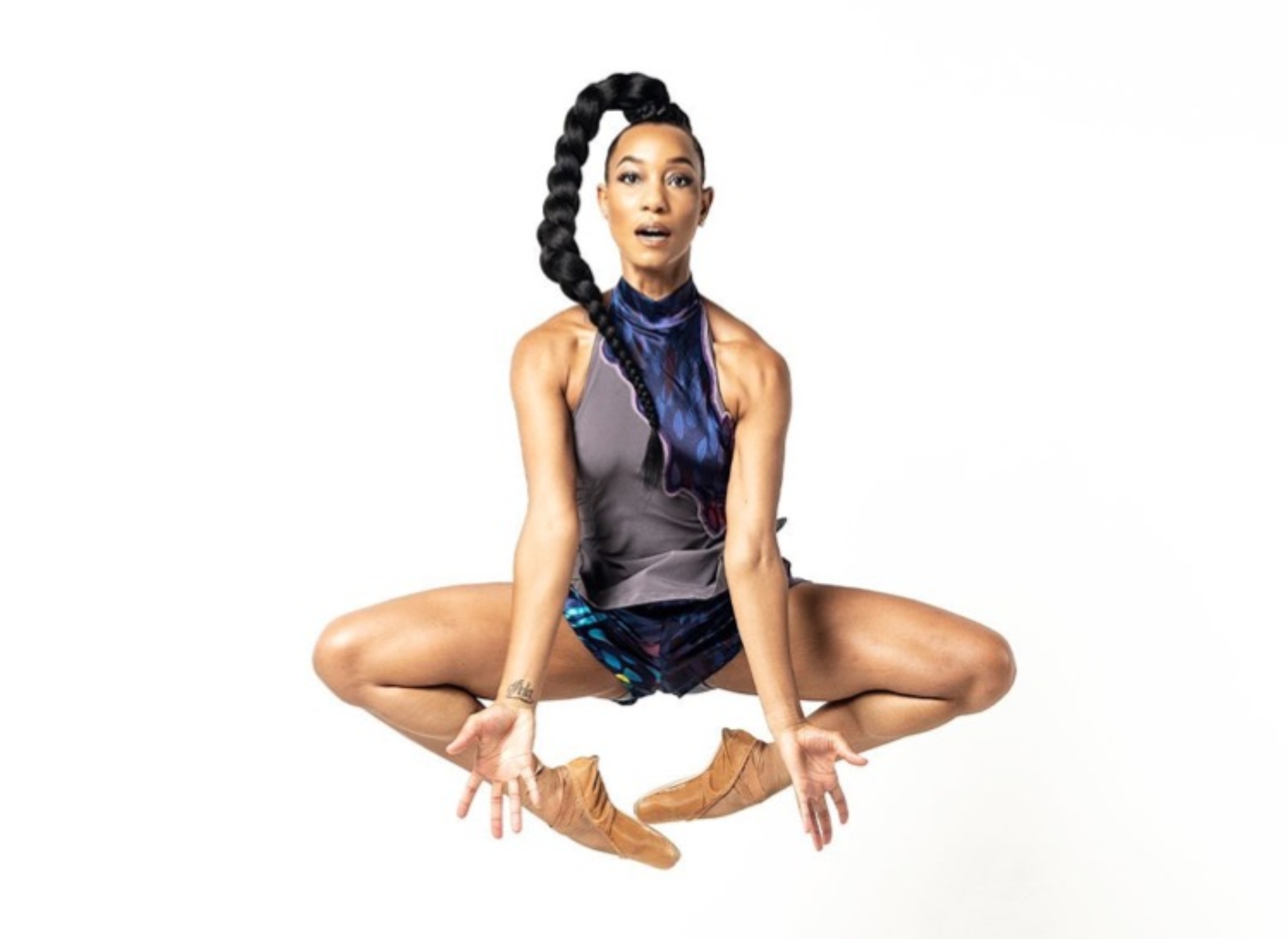
Conservatory alumna shares how UMKC and Kansas City connections helped advance her career
Without the University of Missouri-Kansas City, Miyesha McGriff (B.F.A. ’11) says she doesn’t know if she would have continued her career as a dancer.
As a teen, McGriff, a Kansas City native, grew up spending her summers at The Ailey School, an exclusive modern dance school based in New York City.
She trained at the Kansas City Ballet School from a young age where she became a company apprentice. While finishing her high school career, McGriff knew UMKC was her first choice of college — thanks to a ballet teacher who also happened to be a professor at the Conservatory.
“I put in my applications and did my audition, and it was like instant, I knew I was going to UMKC. That ended up being a huge moment for me because without my UMKC connections or my Kansas City connections, I don’t think I would be where I’m at,” McGriff said.
McGriff’s decision to attend the Conservatory set off a chain of events resulting in her joining the Collage Dance Collective of Memphis, Tennessee, as a company member in 2017. But how she got there was anything but the typical path for a career dancer.
After graduating from the Conservatory in 2011, McGriff said she was nervous about entering the professional dance world but she audition for the Dallas Black Dance Theatre in Dallas, Texas anyway.
“It was interesting because I was ballet trained but it was more of a contemporary-modern based company,” McGriff said. “It was really hard. So after about a year, I quit. I just wanted to give up. It was the first time that dance became work for me and not just a release.”
McGriff then decided to take a break from dance and made the decision to move back home to Kansas City. She took a job at the Greater Kansas City Community Foundation.
“Everyone there was so amazing, they recognized how I used my dance background to enhance my performance at my job. I was very organized, I was always on time, and it helped me move up in promotions pretty quickly,” McGriff said.
But even though she was taking a break from professional dance, she still had the itch to get back on the stage. McGriff said she would save all her paid-time-off during the year to take time off for rehearsals and perform with the Wylliams/Henry Contemporary Dance Company, a Kansas City-based company.
“I would go to work from 7 a.m. to 4 p.m., I would go to rehearsals from 5 – 11 p.m. and then on Saturdays, I would go to additional rehearsals. Then when we had theater week, I would use another week of PTO,” McGriff said. “Everyone in the office knew it. They would come to all of my shows and support me.”
After working at the Community Foundation for about two years, McGriff said she felt the pull of professional dance once again. So, when she got an opportunity in New York City, she decided to ask for a seven-week leave of absence.
“I contacted our human resources representative to ask for the leave, and she had just told me, ‘No. You need to go and experience this and if it doesn’t work out, you can come back, and you will have a job.’ I still have such a good relationship with them to this day, I’ve been away from Kansas City for eight or nine years and I know I can still call them,” McGriff said. “I am so thankful for that time with them because it made me appreciate dancing and what it means to have it.”
Once in New York, McGriff spent seven weeks trying to find a job. When she went into the Alvin Ailey American Dance Theater to see some old friends she struck up a conversation with someone she knew from her time there as a teen.
“She asked me ‘What are you doing?’ and I was just like, ‘I don’t know. I think I’m trying to figure out my life,’” McGriff said.
That conversation would help her land a job as a summer program chaperon, which lead to another job within the organization. She worked her way up to an administrative assistant to the directors of the Juniors Divison.
“Everyone’s path is for a reason and you have to respect your path and journey. The biggest thing you have to learn is that everyone else’s path is not your path. It’s the hardest and the biggest thing,” McGriff said.
After teaching for a couple of years, McGriff said she once again felt the pull to dance professionally when an old Ailey coworker reached out about an opportunity at the Collage Dance Collective, where she dances today.
“UMKC absolutely helped me get where I am today,” McGriff said. “Everyone there is rooting for you. That’s why they are professors, that’s why they are in the space that they are. They want you to have a good experience, if not better, than what they had.”
Feb 23, 2022
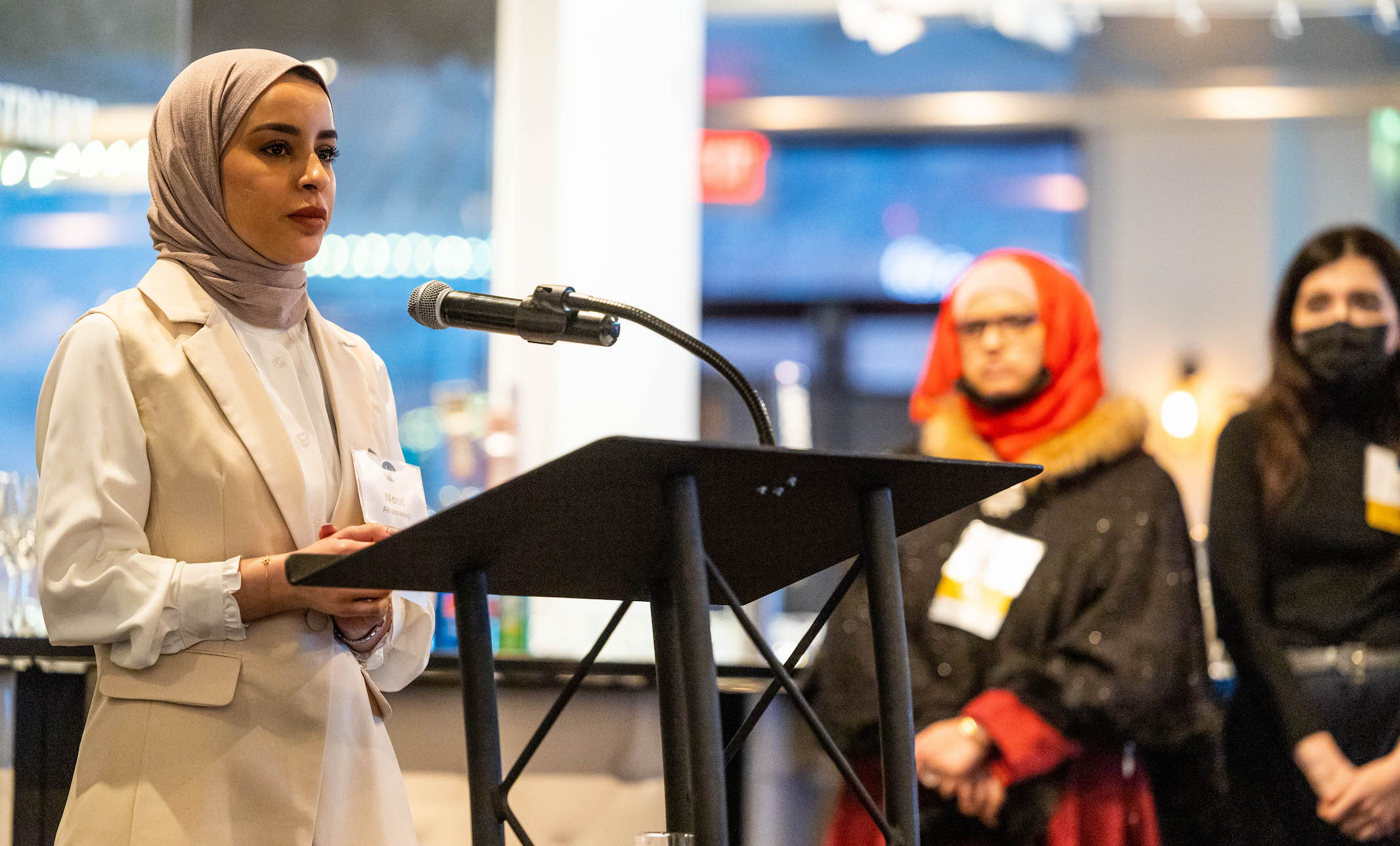
More than $2 million has helped enrich academic careers of more than 2,000 women
The UMKC Women’s Council Graduate Assistance Fund has awarded $90,000 to 53 recipients to support post-graduate work this year.
The UMKC Women’s Council celebrated 51 years of supporting women in graduate studies and honoring the 2022 awardees with a reception on Thursday, Feb. 24. Each woman’s focus is different, but their dedication to their academic and professional careers is paramount.
2022 UMKC Women's Council Graduate Assistance Fund recipients
Sunny Rugerri, Ph.D. ‘22, is studying to be a nurse researcher with a focus on developing programs and interventions to improve patient health. The GAF selected Rugerri as a funding recipient to support her research on low compliance rates among women with breast cancer who are prescribed oral medications that reduce the possibility of their cancer returning following surgery.
“I want to provide courage and eventually create a tailored intervention for the vulnerable populations and support them to endure the painfully long process of fighting and surviving breast cancer.” — Sunny Rugerri
Rugerri’s research was inspired by a fellow nursing student and friend who contracted breast cancer when she was 30 years old. Her outcome has been good, but her battle left a mark on Rugerri.
“She held on to her dreams even as her condition worsened,” Rugerri says. “I learned that breast cancer can be devastating for anyone.”
Leslie Boe, J.D., UMKC Women's Council president
While taking oral medications, such as Tamoxifen, for five years greatly improves patients’ chances of surviving the disease and mitigating its reoccurrence, patients often stop taking them because of side effects.
“I want to provide courage and eventually create a tailored intervention for the vulnerable populations and support them to endure the painfully long process of fighting and surviving breast cancer,” Rugerri says.
Fellow GAF funding recipient Anya Pogorelova, D.M.A. ’22, was inspired by one of her earliest piano teachers to pursue music as a profession.
“Rusudan Chigogidze was a remarkable woman,” Pogorelova says. “She was 77 years old when she took me on as a student. That alone should speak to just how inspiring she was.”
Pogorelova is committed to diversifying classical music literature by commissioning composers from a variety of backgrounds and producing professional recordings that will be available on easily accessible platforms such as Spotify and Apple Music. Just as Pogorelova’s teacher was her inspiration, she wants to inspire her students.
“It’s very important to amplify diverse voices in music, and it’s just as important to ensure that this generation’s composers receive proper compensation for their work.” — Anya Pogorelova
“I think every concert-goer and every musician would be thrilled to see themselves represented on stage and in the music. As a middle school teacher, I felt it was incredibly important for my students to have the ability to draw personal connections to composers, guest artists or musical figures. I wanted them to find that sense of familiarity and think, ‘That person is a lot like me. I could do that too!’ That’s an experience I wish I had when I was growing up.”
GAF funding will allow Pogorelova to commission work performed by the UMKC Wind Symphony.
“It’s very important to amplify diverse voices in music, and it’s just as important to ensure that this generation’s composers receive proper compensation for their work,” Pogorelova says.
UMKC Women’s Council president Leslie Boe became involved in the Women’s Council after attending an awards ceremony. She was inspired by the women graduate students’ work and was invited to apply for a position on the board of directors.
“The work our graduate students are doing is always innovative, interesting and impressive. These hardworking women are going to change the world, and I’m continually inspired by them. I’m honored to play a small role in their journey.”
Established in 1971, the UMKC Women’s Council Graduate Assistance Fund supports UMKC women working toward post-baccalaureate degrees with up to $2,000 in funds that furthers their completion of graduation requirements and enriches their educational experiences.
Feb 22, 2022
Assistant Professor Erin Hambrick, Ph.D. was one of several experts featured
Erin Hambrick, Ph.D. was featured in the documentary, Becoming Trauma Responsive, which premiered Feb. 21, 2022. The film, which was produced by the Kansas State University College of Education, asked experts to weigh in on the effects of trauma on learning, behavior and developing relationships.
The film documents the experiences of three schools in Kansas and Missouri both before and during the COVID-19 pandemic.
Hambrick, who studies the effect of trauma on children, was one of the experts who spoke about trauma and how trauma-responsive adults can improve resiliency in children.
"When we make our classrooms and our work places more trauma responsive, we are actually helping everyone. It's just that we might be helping people who have histories of trauma even more," said Hambrick in the film.
The film is available to view online here.
Feb 22, 2022
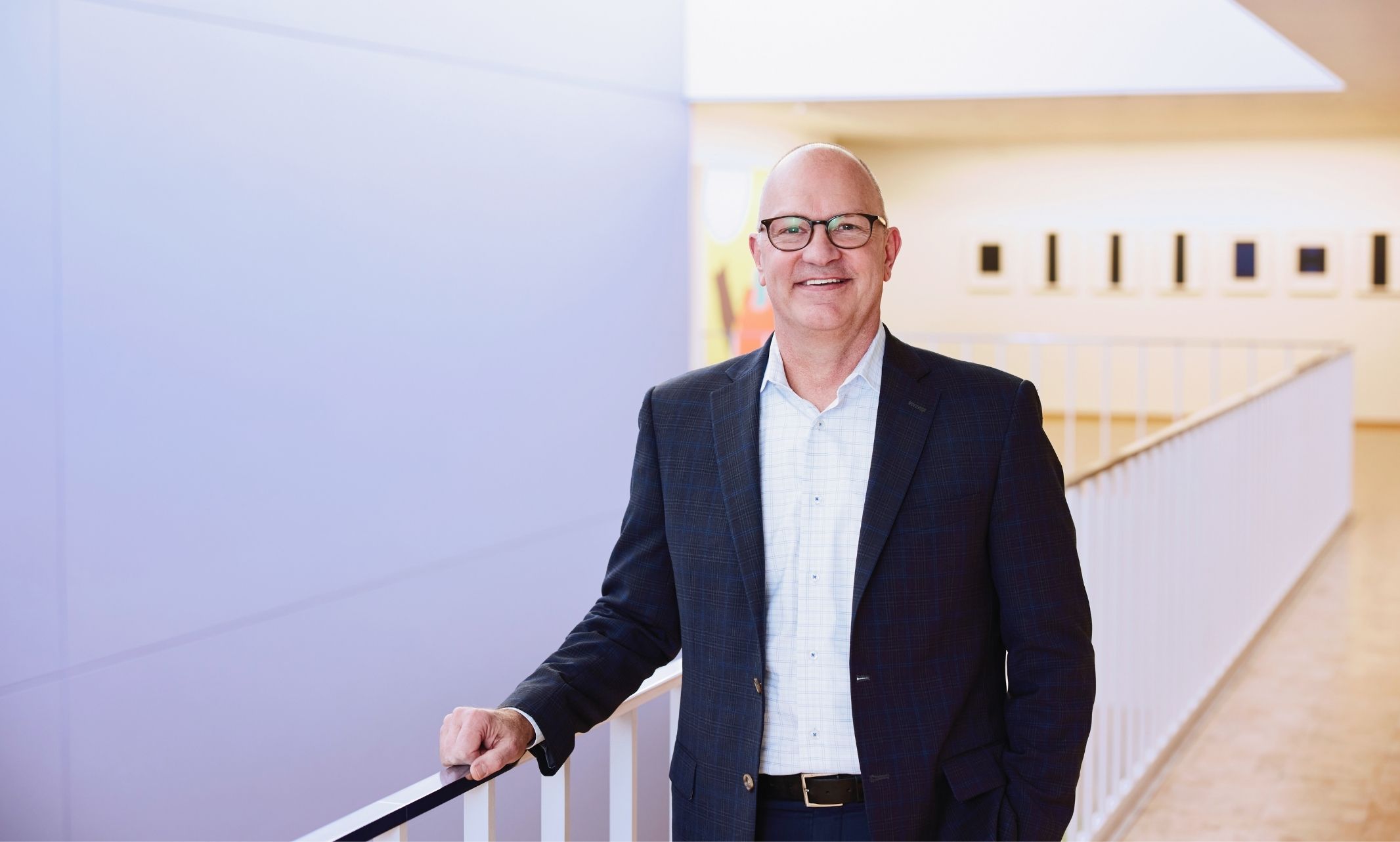
Bloch School of Management selects Mike Perry to receive 2022 Alumni Award
Each year, the UMKC Alumni Association recognizes the achievements of outstanding alumni with an awards celebration.The Henry W. Bloch School of Management is honoring Mike Perry (B.B.A. ’89) with its Class of 2022 Alumni Achievement Award.
Mike Perry (B.B.A. ’89) is the president and chief executive officer of Hallmark Cards, Inc., the iconic, family-owned brand founded and based in Kansas City. In addition to the well-known greeting cards business, Hallmark Cards, Inc. owns Crayola and Crown Media Family Networks, offering three linear cable channels and a subscription streaming service.
Perry has been an employee of Hallmark since 1989 and held numerous leadership positions within the company, including as president and CEO of Crayola. Perry is only the second person outside of the Hall family to be named CEO of Hallmark Cards, Inc.
A long-time member of the Kansas City community, Perry is involved with United Way and Children’s Mercy.
We asked Perry about his long career with Hallmark and how his time at UMKC helped shape his career.
You’ve managed so many different facets of business from marketing to finance, HR to operations. Which is your favorite? What has been a favorite project or initiative you have led or been part of?
Honestly, I have enjoyed each of the various roles. I have always enjoyed more general management roles that incorporate each of the different functions across the business. My favorite roles, outside of my current role, were as the president of Hallmark Flowers and as the president & CEO of Crayola. Both roles prepared me nicely for my current assignment.
What advice do you have for students who’d like to follow in your footsteps?
Go do what you get excited about doing. A job with a promising career path or high compensation won’t be enough in the end. Don’t get me wrong, these are not bad things –but if you lack passion for the work, there will likely always be a nagging “fulfillment gap.”
How did UMKC prepare you for, or contribute to, your success?
I was grateful to have UMKC as an option. I needed to work to attend college, and I knew clearly that I was interested in business. UMKC gave me great options that enabled both things.
I had good instructors. The practical applications for life and business were good, but the enduring value instilled was a mindset toward continuous learning and growth. The mentors and new information we need to keep growing and evolving –it’s all out there. But you do have to have a proactive plan for seeking it.
Word or phrase you use most often?
Thank you.
What is your favorite book, movie, podcast, television show, etc.?
Wow –not sure I have just one?? But let me be clear that my favorite cable channel is the Hallmark Channel!!
About the Alumni Awards
Join us in honoring Perry and the other Class of 2022 awardees at an in-person celebration at 6 p.m. April 29, at the James C. Olson Performing Arts Center. To register, visit UMKC's Alumni Association website. If you are unable to attend the event but would like to donate to student scholarships, contributions can be made online.
Feb 21, 2022
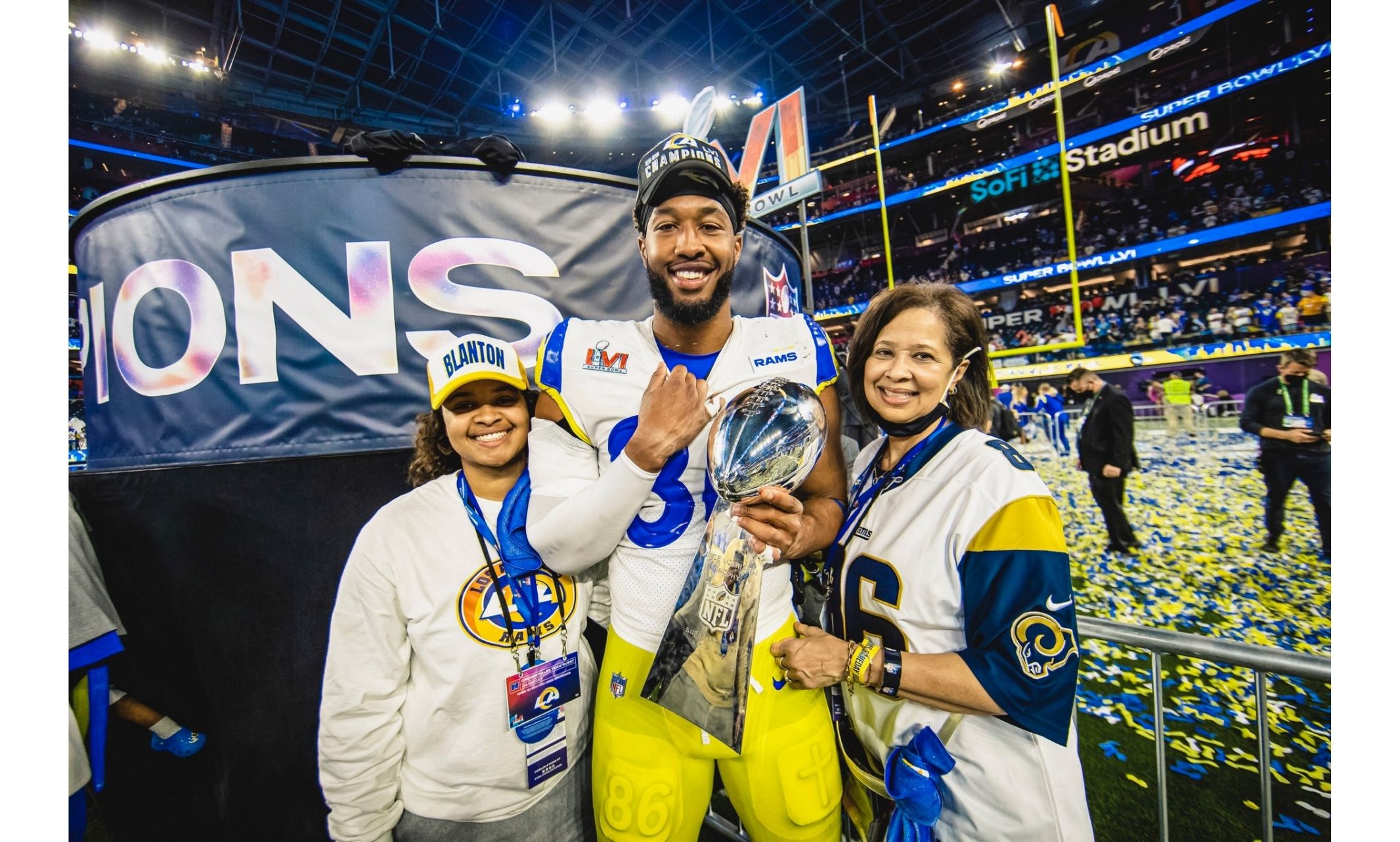
Former Kansas City Chiefs player and current UMKC staff member helped cheer his son to two Super Bowl wins.
Jerry Blanton, Associate Director of the Student Union, thought watching his son win the Super Bowl was a once in a lifetime experience. Then it happened again.
Talent and athletic ability run deep in the Blanton family. Jerry Blanton was drafted out of the University of Kentucky by the Buffalo Bills. After a short stint in New York, he came to Missouri and signed with the Kansas City Chiefs. Blanton played linebacker for the Chiefs for seven seasons.
“I loved playing football. Back then the game was different, and I enjoyed being on the field, working hard and playing in Kansas City.”
When Blanton retired from the NFL, he immediately began taking steps to fulfill his lifelong dream of working in law enforcement. As a kid he always dreamt of becoming an FBI agent and while in college, he prioritized his studies with that end goal in mind. Blanton worked for a number of years as a lead investigator for the Kansas City’s prosecutor’s office in the drug and sex crimes unit.
After several years in that role, he sought out a new opportunity in a different industry working as an area manager for a major beer distributor. Blanton enjoyed that role for a number of years before moving to Kentucky to serve as Deputy Commissioner over more than 52 state parks and 17 resorts.
“That was one of the best jobs I’ve ever had. I loved the work and was challenged by it. At the time I was the highest-ranking African-American ever appointed in the history of Kentucky’s State Parks Department and took pride in it.”
But with a young son and daughter back in Missouri, Blanton needed to get back to the Show-Me state.
Upon his return to Missouri, Blanton started working out regularly with his son Kendall, a basketball and football player in his grade school years. Blanton enjoyed working out with his son and helping instill strong values including work ethic, compassion, kindness and love.
“I always taught him to have a strong work ethic and to be humble. At times when he was defeated or down on himself I’d tell him ‘sometimes you have to go through the back door to open the front,’ meaning keep working hard and trying your best and things will work out.”
Things certainly did work out for Kendall Blanton. After graduating from the University of Missouri, Kendall signed with the LA Rams as a free agent. When the Rams starting tight end got injured, Blanton was the next man up on the roster and became the starting tight end for Super Bowl 56 in 2022. In his third season with the LA Rams, Blanton got to start in the big game and win a championship.
Then, Kendall signed with the Chiefs for the 2023 season, and once again found himself on the winner's podium, earning a second consecutive Super Bowl ring.
“I always tell my son how proud of I am of him for living his dream. Winning a Super Bowl is something few NFL players get to experience and I’m so proud of him for accomplishing that milestone and getting this experience.”
“I’m a little jealous. I never made it to the playoffs,” Blanton said the day after the 2023 game. “I’m living through him now. If you play any sport, you want to get to the peak, and he’s done that twice now.”
Feb 21, 2022
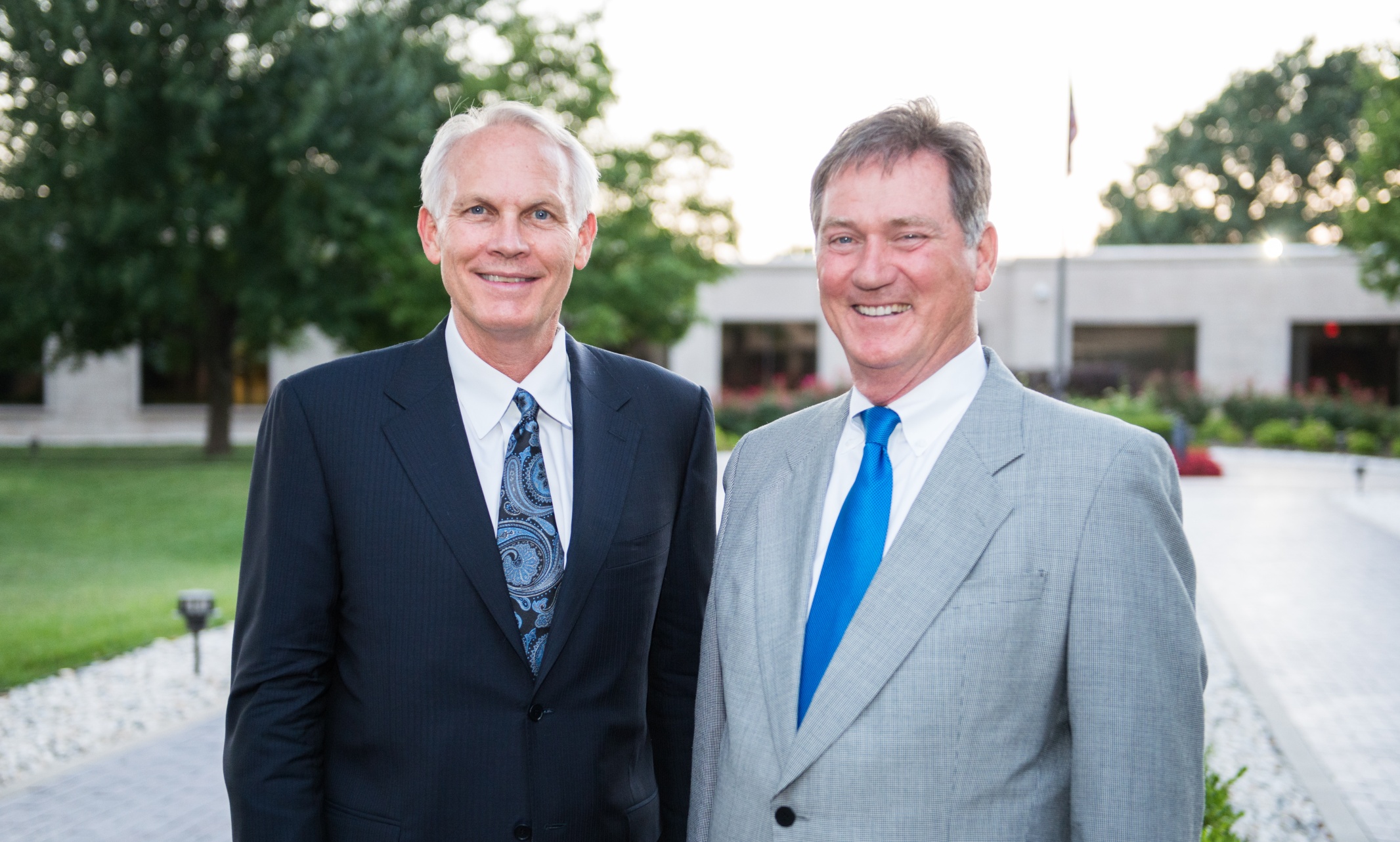
UMKC School of Law selects J. Kent Emison to receive Alumni Award
Each year, the UMKC Alumni Association recognizes the achievements of outstanding alumni with an awards celebration. UMKC is honoring J. Kent Emison (J.D. ’81) with its Class of 2022 School of Law Alumni Achievement Award.
Not long after graduating from UMKC School of Law in 1981, Emison met Bob Langdon, who has now been his law partner for 35 years. They had a monumental product liability case, Baker vs. General Motors, which found its way to the U.S. Supreme Court, and a favorable verdict brought national attention to their growing practice.
Emison has gone on to be recognized by countless professional organizations. He is a Fellow in the International Academy of Trial Lawyers, placing him in the top 1% of lawyers in the world. In 2017, he received the Thomas G. Strong Trial Attorney Award from the Missouri Association of Trial Attorneys for his leadership.
Inspired to become a lawyer by his great uncle, Emison now pays it forward. He has sponsored many law students to attend conferences and seminars, and he and his firm regularly sponsor mock trial teams and provide scholarships.
How did you know you wanted to be an attorney?
I knew I wanted to be an attorney when I was a junior in high school. I was raised on a dairy farm and most of my extended family on both sides were farmers. However, I had a great uncle who was a law professor at Washington University. He would visit my family once a year. He was a very dynamic person who made a point to have a conversation with me whenever he visited. This made a great impression on me. While this was not the only reason I wanted to be an attorney, it was a great influence, along with the realization that I was a not very good at farming!
What was the most exciting or challenging part of Baker v. General Motors?
The most challenging part of the Baker case was the sheer scope of it. Bob and I were the only two attorneys who worked on the trial part of Baker. GM had five or six different firms retained to defend the case, including Dick Bowman, the lead GM trial lawyer from Bowman & Brooke, a firm based in Minnesota. The case was an enormous undertaking for us, but after almost 10 years and a trip to the U.S. Supreme Court we were successful in resolving that case. Ken Starr was GM’s lawyer in the Supreme Court. While Bob and I were the trial lawyers, we worked with Laurence Tribe on the Supreme Court appeal. Professor Tribe is a great lawyer and was tremendous to work with on the Baker case. The entire experience of seeing the case go to the Supreme Court and the great lawyering on both sides was very exciting.
What advice do you have for students who’d like to follow in your footsteps?
Regardless of what type of law you practice, work with good lawyers who are good people.
Do not worry about how much money you make when you start your career. Make sure you like what you do and who you work with. If the answer to either of these is “no,” think about a change.
Regardless of the type or size of project you are working on, make sure your work product is done in a quality manner. Bigger and better projects or cases will result from excellent work on smaller cases and projects.
When you get an assignment from another attorney, be sure you fully understand the assignment. I recommend to young lawyers to do the following: If possible, get the assignment in writing. If you are given a verbal assignment, then repeat your understanding to your boss and then follow it up with an email or something in writing to document the assignment. Be sure to get the due date for completion, and don’t be late!
About the Alumni Awards
Join us in honoring Emison and the other Class of 2022 awardees at an in-person celebration at 6 p.m. April 29, at the James C. Olson Performing Arts Center. To register, visit UMKC's Alumni Association website. If you are unable to attend the event but would like to donate to student scholarships, contributions can be made online.
Feb 21, 2022
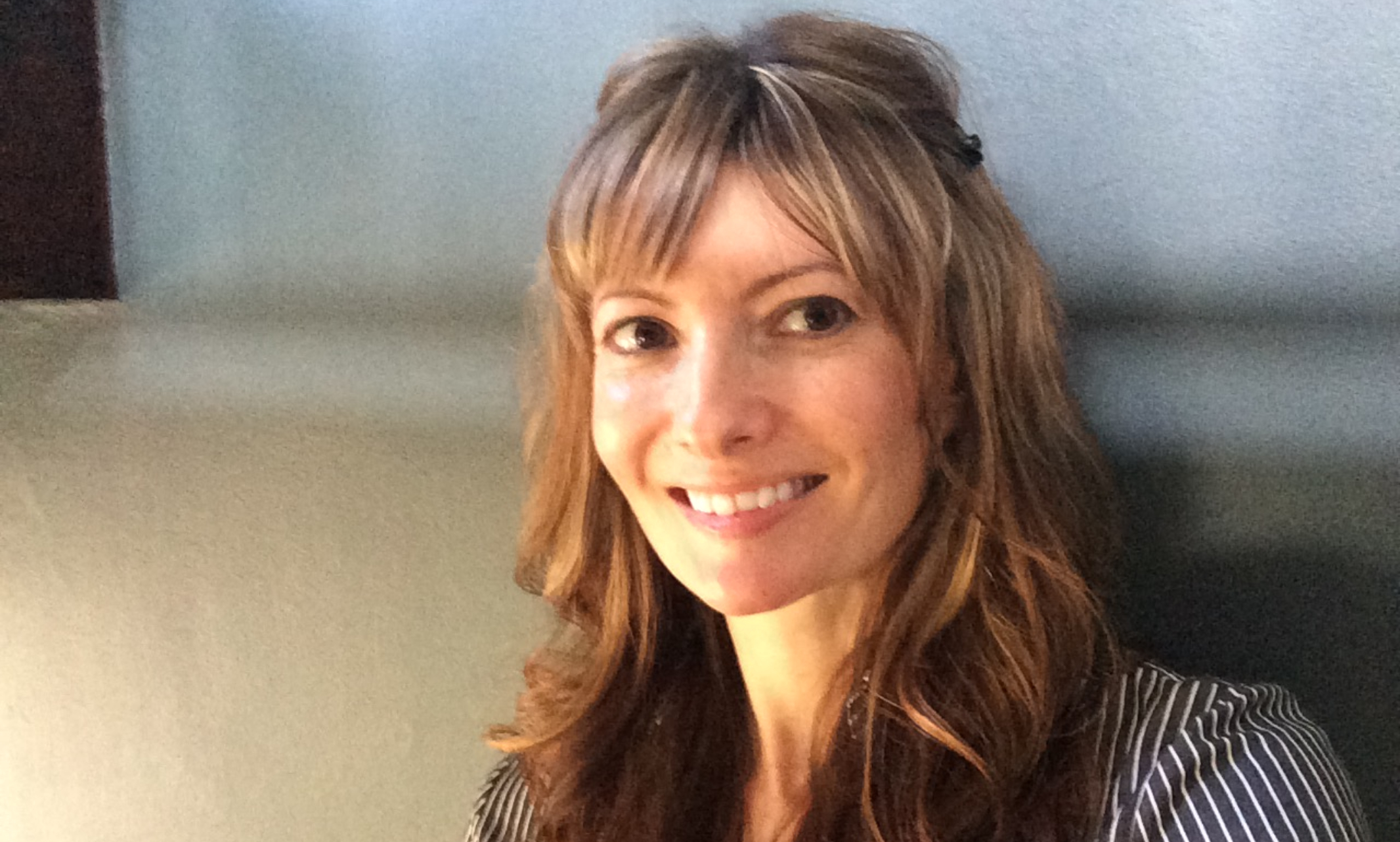
Melissa Zarda receives College of Arts and Sciences Alumni Award
Each year, the UMKC Alumni Association recognizes the achievements of outstanding alumni with an awards celebration. The UMKC College of Arts and Sciences is honoring Melissa Zarda (B.A. '02, M.A. '07) with its Class of 2022 Alumni Achievement Award.
Melissa Zarda owns and runs a successful small business as a freelance graphic and web designer, all while still taking the time to fight for human rights all the way to the Supreme Court. After the death of her brother, Don, she led the cause to prevent people from being fired for their sexual orientation or gender identity in his honor. Zarda sought help from the ACLU, a trusted attorney and the Director of the Stanford Supreme Court Litigation Clinic.
What made you choose to continue your brother’s mission after his passing?
We never considered not continuing the case. In order to pursue the case, we had to make a decision in a short window of time after his passing. Bill, my brother’s boyfriend, and I were on the same page from the beginning. We had both spent so much time consoling Don over the years, since this case impacted him so heavily, that we knew there was no other option. We also knew there were so many others who were discriminated against in the workplace, just like Don was, we wanted to do whatever we could to help them fight, too.
What advice would you have for someone taking on such a monumental case?
Surround yourself with experienced and trustworthy people. I relied on our teams from the ACLU and the Stanford Supreme Court Litigation Clinic, as well as other nonprofits such as Freedom for All Americans. I can’t thank these groups enough. Reach out to friends and family for support, and try to take care of your mental and physical health. The ups and downs can be emotionally draining.
How did UMKC prepare you for your success?
All of my instructors were genuinely interested in my well-being. They would offer encouragement and ideas to further my study in whatever I was passionate about. After going to school in the suburbs, it was exciting to be on an urban campus and to hear different perspectives. I applied the skills I learned at UMKC to every job I’ve ever had post-graduation.
Zarda is a graduate of the College of Arts and Sciences with a bachelor’s in Studio Art and a master’s in Sociology. She enjoys spending her spare time volunteering with various animal welfare nonprofits.
About Alumni Awards
Join us in honoring Zarda and the other Class of 2022 awardees at an in-person celebration at 6 p.m. April 29, at the James C. Olson Performing Arts Center. To register, visit UMKC's Alumni Association website. If you are unable to attend the event but would like to donate to student scholarships, contributions can be made online.
Feb 18, 2022
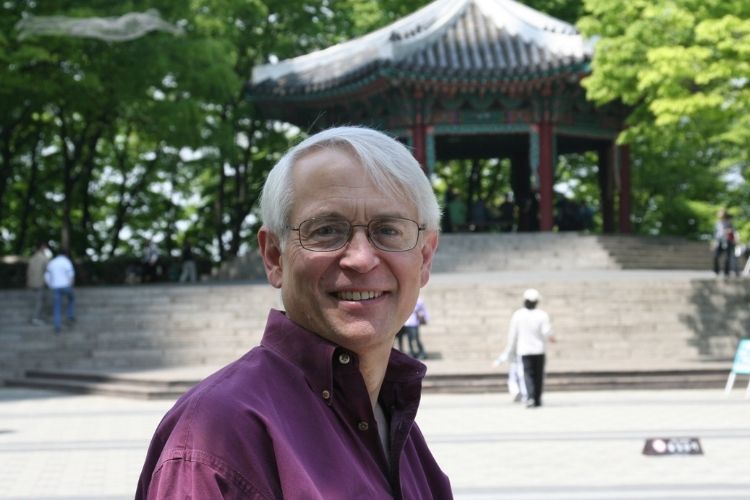
James Mobberley was recognized by the American Academy of Arts and Letters for music composition
James Mobberley, Curators’ Professor Emeritus in the Conservatory, was recently named a national Music Award recipient from the American Academy of Arts and Letters.
Mobberley is one of four people to receive the Arts and Letters Award in Music, honoring outstanding artistic achievement and original compositional voice. Each awardee receives $10,000, plus an additional $10,000 to record their composition. Awardees will also have their music presented in concert at the Academy.
“The American Academy of Arts and Letters is one of the most significant organizations in the world that focuses on support of creative work in multiple fields,” said Mobberley. “I am more than honored and humbled to be included among this year's group of extraordinary peers, especially now as we collectively begin the long, laborious recovery process from two years of COVID's devastating effect on the arts.”
Mobberley is one of 18 Music Award recipients in 2022, with awards totaling $205,000. Candidates for these awards are nominated by the Academy’s 300 members.
Mobberley joined the UMKC Conservatory faculty in 1983 and helped build the university’s highly regarded music composition program in his years with the university. He retired in 2016 as the Curators’ Professor of Music Composition. He previously has been awarded the Rome Prize and a Guggenheim Fellowship. Mobberley has been a resident composer with the Kansas City Symphony (1992-1999), and a visiting composer with both the Taiwan National Symphony (1999) and the Fort Smith Symphony (2000).
“Dr. Mobberley was a cornerstone of not just the composition area but the entire Conservatory for over three decades,” said Andrew Granade, interim dean of the Conservatory. “We’ve long known and celebrated the excellence of his musical gifts here in Kansas City, but it is gratifying to see it recognized nationally by the American Academy, one of the premier societies dedicated to advancing the arts in the United States. I can think of no one more deserving of this award.”
The American Academy of Arts and Letters was founded in 1898 as an honor society of the country’s leading architects, artists, composers, and writers. Awards are given as part of the Academy’s mission to foster interest in literature, music and the fine arts.
Feb 17, 2022
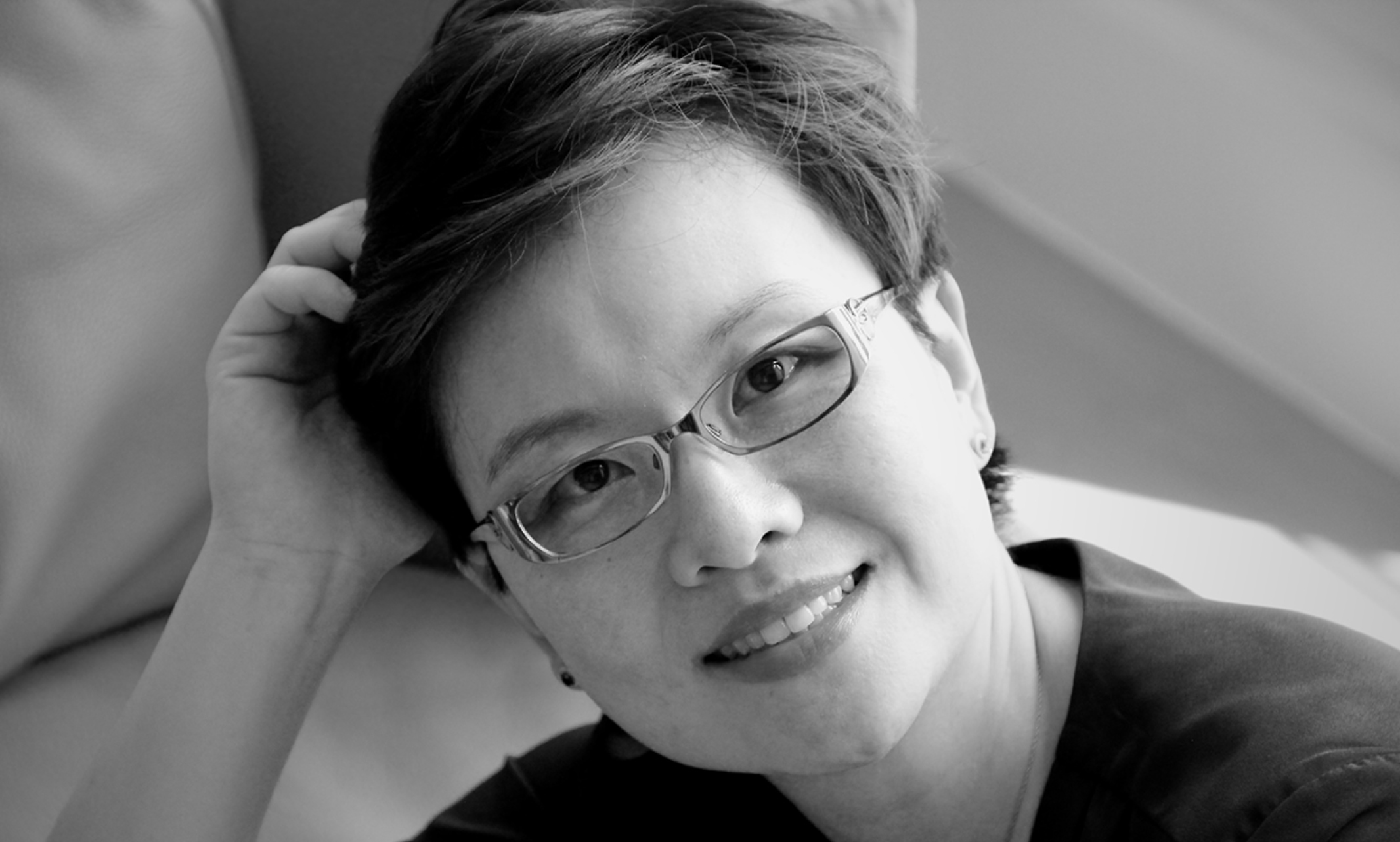
UMKC honors Xi Wang, Ph.D. with the Conservatory Alumni Achievement award
Each year, the UMKC Alumni Association recognizes the achievements of outstanding alumni with an awards celebration. The UMKC Conservatory is honoring Xi Wang, Ph.D. (M.M. ‘03) with its Class of 2022 Alumni Achievement Award.
Born 1978 in China, just after the cultural revolution, Xi Wang learned never to take anything for granted. Recognizing her musical talent, her father and mother made great financial sacrifices to ensure that she received training. After completing her bachelor’s in music from the Shanghai Conservatory of Music, Xi came to UMKC to study under Chen Yi, Ph.D. and Zhou Long, Ph.D.Assistant Professor Xi holds a doctoral degree from Cornell University. She is internationally celebrated with works commissioned by the Philadelphia Orchestra, Atlanta Symphony and Shanghai Philharmonic. In addition to composing, Xi teaches at Meadow School of Arts of Southern Methodist University.
Was music a large part of your childhood?
My father bought me a toy piano as a gift when I was four. The toy piano cost the equivalent of two U.S. dollars at that time-about half of my mother’s monthly income. My father taught me the piano by playing some children’s songs using one finger. One year later, he borrowed an old piano from the museum where he worked and brought it home. I started learning to play some longer, more complex songs with three fingers. Apparently, I showed unusual sensitivity to pitch and an excellent ability to memorize tones. A music teacher told my parents that he thought I had a talent for music. So, my parents found me a piano teacher. One dollar per lesson, four lessons per month, four dollars per month. That was my mother’s entire monthly salary!
When did you first realize that you wanted to work in music?
When I started winning local piano competitions, my parents were excited! Music was a high-class art form they had hardly dared to imagine. When I turned six, my parents cashed out all their savings and gathered money from their relatives and friends—around $250—to buy me a new, real piano. When it was delivered to our home on a tricycle, all the neighbors came out to touch the “furniture” they had only seen in newspapers or magazines. My parents spent the next three years working and saving to pay off this “fancy furniture.”
Music is a beautiful, but very expensive gift that my parents gave me in childhood. I learned my first lesson about life- never take anything for granted. Education and opportunity are precious.
Has teaching changed your relationship with music? What do you enjoy most about it?
Teaching deepened my relationship with music. It makes me rethink of what I have learned about music. Through the process of teaching, I am learning new things constantly too.
What advice do you have for students who’d like to follow in your footsteps?
Work hard and keep challenging yourself. It’s not necessarily a bad thing if you encounter something “unfair.” It will happen and it happens in everyone’s life. You just have to flip it to your advantage, let it motivate you. Take it as an opportunity to make you stronger while accepting it could feel very frustrating at the beginning.
How did UMKC contribute to your success?
I had remarkable professors who not only helped me to learn about music, but also took care of me as their child and continuously fostered me along my career development even after I graduated. Dr. Chen Yi, Dr. Zhou Long, Dr. James Mobberley, Dr. Paul Rudy, Dr. William Everett and many others, including staff members at the international student office. I also met many warm-hearted friends, who loaned me their notes, helped me to learn the computer, drove me around and explained American culture to me.Besides the academic preparation, it was people’s care and love that has shined through all the years since I started my American adventure at UMKC.
What is your proudest accomplishment?
Being a mother of two adorable children while maintaining a career as a composer and a professor.
Where can you be found on the weekends? What are your hobbies?
I have about 20 plants at home to water during work breaks. Occasionally, I do some clay sculpture and painting.
About Alumni Awards
Join us in honoring Xi and the other Class of 2022 awardees at an in-person celebration at 6 p.m. April 29, at the James C. Olson Performing Arts Center. To register, visit UMKC's Alumni Association website. If you are unable to attend the event but would like to donate to student scholarships, contributions can be made online.
Feb 17, 2022
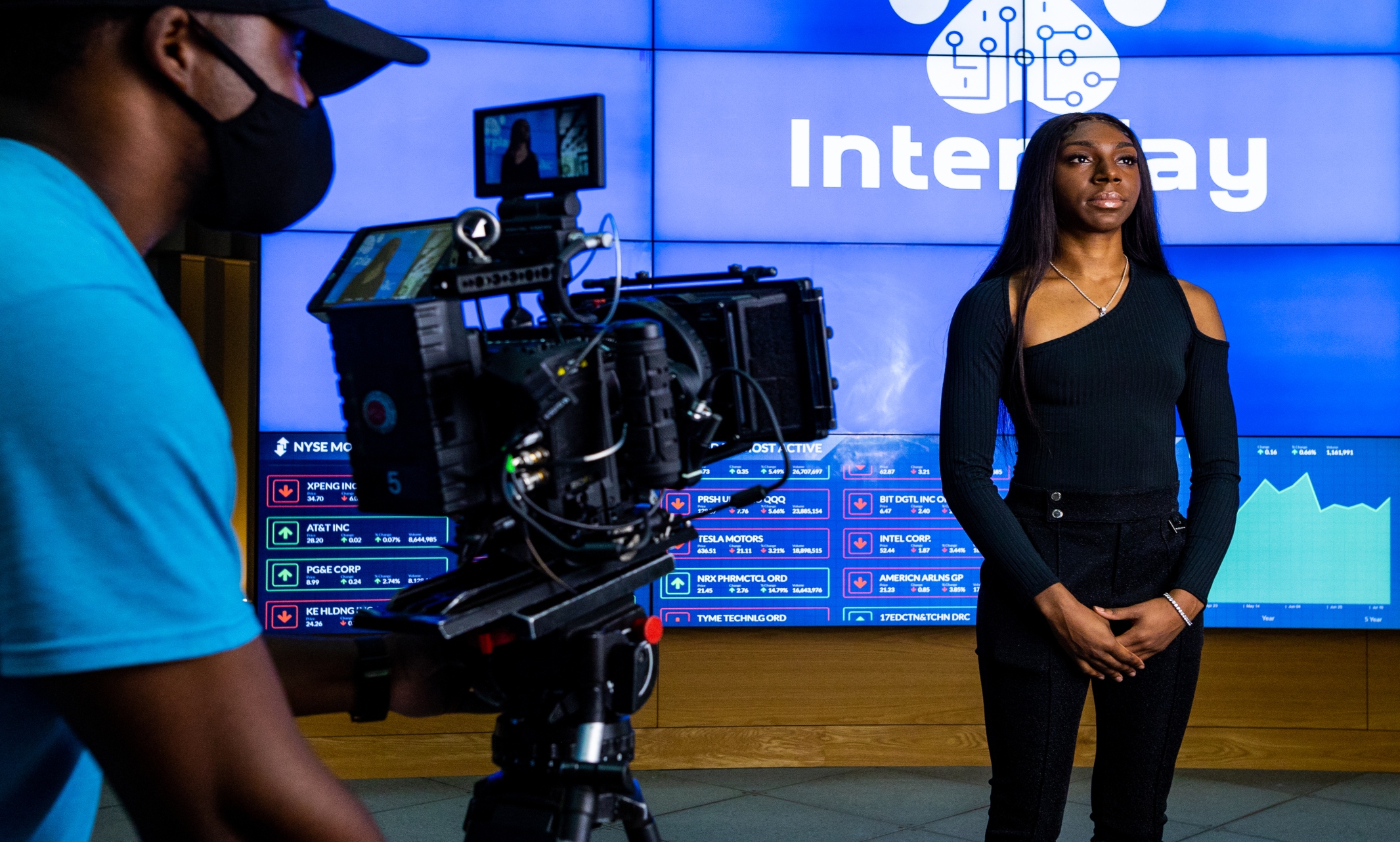
Jonaie Johnson is one of 20 contestants on ‘The Blox’
UMKC MBA student Jonaie Johnson is competing in a 17-part online reality TV series featuring startup entrepreneurs from around the country.
Johnson is the founder of Interplay, a company marketing an interactive dog crate that allows owners to interact with their pets while they are away from home. The show is called “The Blox,” and is available online by downloading an app from BetaBlox, a Kansas City company providing multiple forms of support for entrepreneurs.
The show follows a game format with daily winners of competitions on entrepreneurial themes such as inbound marketing, growth hacking and fundraising.
This is just the latest accolade for Johnson and Interplay. She was recognized as the UMKC Henry W. Bloch School of Management Student Entrepreneur of the Year in 2020 as an undergrad. She is currently enrolled in an MBA program at the Bloch School.
Johnson also was a starter on the UMKC Women’s Basketball team that won a Western Athletic Conference championship in 2020.
Interplay is a dog crate designed to provide remote interaction – including video and audio access, locking and unlocking features and the ability to provide food and water – for a dog and its owner through a mobile app.
“I developed the idea for Interplay for a project when I was in high school,” Johnson said. “My aunt was always leaving our family events to go home to feed her dog. I thought, ‘Wouldn’t it be great to do that remotely?’ I want Interplay to be the Apple of dog crates.”
Feb 16, 2022
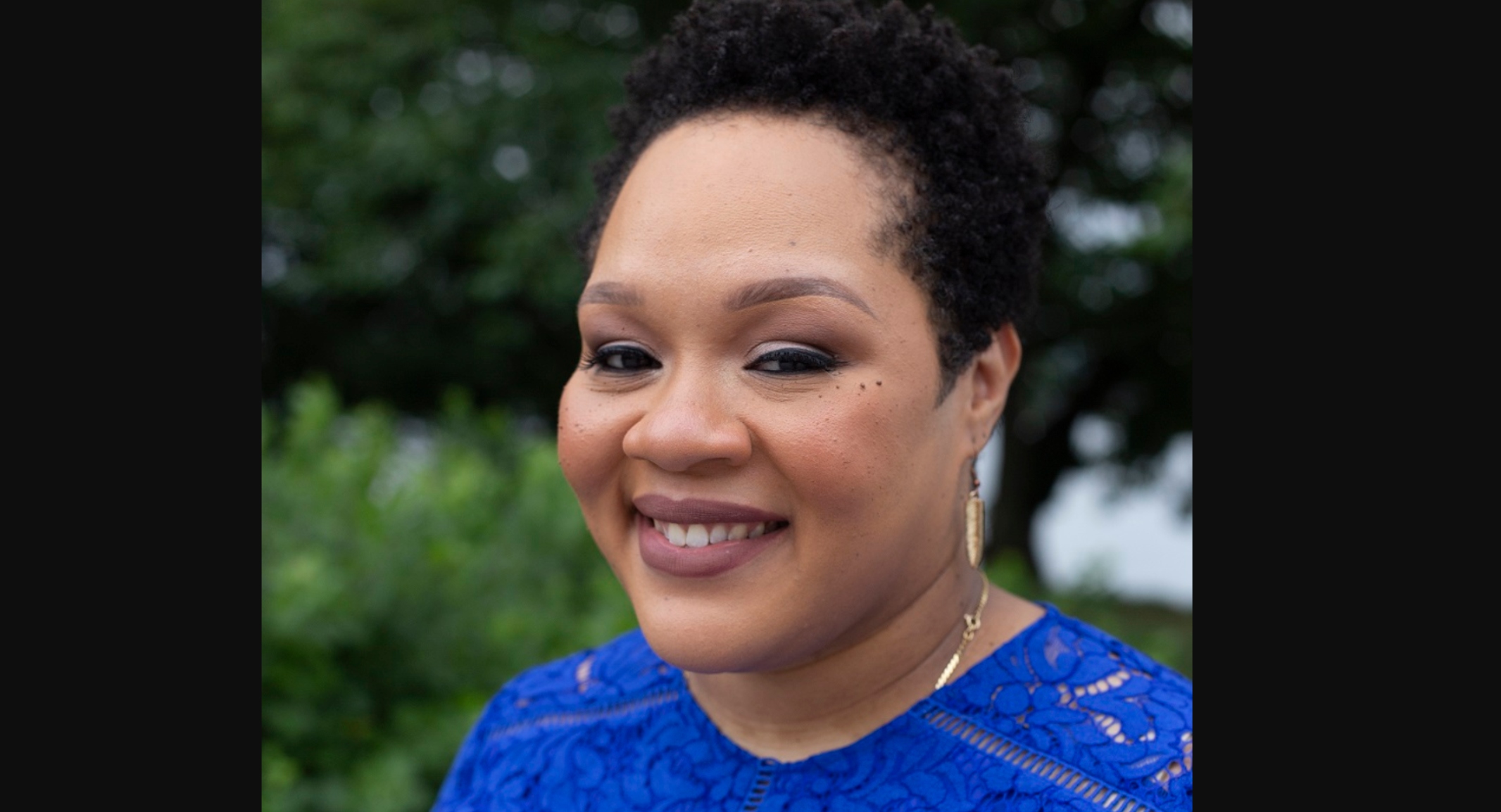
Yamiche Alcindor has become a go-to voice in analyzing the most critical political issues
This year’s virtual Martin Luther King Jr. Lecture was hosted by Yamiche Alcindor, an award-winning political journalist who has spent most of her career covering how political policy impacts the everyday American.
Alcindor is the White House correspondent for PBS NewsHour, Moderator of Washington Week and an NBC and MSNBC Political Contributor. She often appears on shows like Morning Joe, Meet the Press and Andrea Mitchell Reports.
The daughter of Haitian immigrants who met while attending Boston College, Alcindor has written extensively on the intersection of race and politics. She has covered the impact of former President Donald Trump’s politics on the working-class, immigration and breaking news from Africa, the Middle East and Asia.
“Being Haitian-American for me, whenever I walk into the White House it is a big deal. I can’t even imagine what my grandparents would think about their granddaughter, who only a few decades after they arrived here, is now in the White House questioning the President of the United States,” Alcindor said.
Alcindor is the recipient of the White House Correspondents’ Association Aldo Beckman Award for Overall Excellence in White House Coverage, as well as the 2020 Journalist of the Year Award from the National Association of Black Journalists. She earned a master’s degree in broadcast news and documentary filmmaking from New York University and a bachelor’s in English, Government and African American studies from Georgetown University.
The 2022 lecture was delivered in a question-and-answer format, in a dialogue between Alcindor and Glen Rice, a reporter who has been at the Kansas City Star 34 years. Rice himself has received numerous national, regional and local journalism awards for investigations, feature writing and breaking news coverage.
The hour-long discussion covered a wide range of topics. Below are a few questions from the discussion.
Question: How did Dr. King’s legacy inspire you? How did his quest for equity inspire you as a journalist?
Alcindor: He inspired me because he was someone who wasn’t afraid of just telling it like it is. He wasn’t afraid of pushing America to be better. He was there on the Selma bridge pushing people to recognize the humanity of Black people. I think about some of the quotes that he said that really stick with me, like what he said about knowing the character of someone during times of challenge and controversy. I often think about those words because I believe right now, we are living through times of challenge and controversy.
Q: Where do you get your news from?
A: As a Miami native, I think about local news first. Supporting local news is so incredibly important. These are the people that are going to tell you where your tax dollars are going, whether the mayor is stealing your money, or if you have a Jeffrey Epstein in your backyard, that’s who is going to uncover it, in the case of the Miami Herald. I read the Miami Herald, the Sun-Sentinel, the Boston Globe, the Washington Post. Nationally, I read the New York Times, the Guardian, in terms of television I watch BBC, NBC, MSNBC, CNN, and a little bit of Fox News.
About the Martin Luther King Jr. Lecture Series
Beginning with the Rosa Parks Lecture on Social Justice and Activism in 2007, and annually since 2009 with the Martin Luther King Jr. Lecture Series, the Division of Diversity and Inclusion honors individuals' tremendous contributions to furthering civil rights by bringing national thought leaders to campus, who provide insight and advocacy to current civil rights issues on education, economic and justice system inequalities.
The goal of the lecture is to encourage UMKC students, staff, faculty and the Kansas City community to build upon the courageous, non-violent activism of Rosa Parks and Martin Luther King Jr., and to increase awareness of present-day avenues to advocate for civil rights through free thought, action and scholarship.
Feb 16, 2022
Faculty Search Support Team works closely with academic search committees
A new initiative to create a more diverse faculty is now underway at the University of Missouri-Kansas City.
A Faculty Search Support Team now works closely with search committees working to fill full-time faculty positions. Led by Makini King, interim vice chancellor for diversity and inclusion; and Diane Filion, vice provost for faculty affairs; the team helps search committee members implement evidence-based inclusive hiring strategies to recruit a diverse pool of applicants and to reduce bias in the review of applications.
The concept was developed by a faculty diversity task force initiated through Roos Advocate for Community Change, a Chancellor’s Office program working to help ensure UMKC is a welcoming place where all can thrive.
“The process produced very intentional and specific recommendations,” King said. “The Provost and Chancellor have been very supportive – it’s a high priority for leadership.”
Acting on the task force’s recommendations, Provost and Executive Vice Chancellor Jennifer Lundgren approved the hiring of two Diversity, Equity and Inclusion Fellows to participate as members of the team. The Fellows are Michelle Smirnova, associate professor of Sociology; and Sandy Rodriguez, associate dean of Libraries. Rounding out the team and providing critical guidance on HR hiring processes is Susan Hankins, the campus Academic HR Specialist.
Step one for the new team was to research best practices in faculty diversification, consulting with J. Luke Wood, Dean's Distinguished Professor of Education at San Diego State University, a nationally recognized expert in the topic.
“We identified the top two places where we can have an impact,” Filion said. “First is the wording of job descriptions along with how and where ads are placed. Second is how search committees evaluate applicants, with a focus on strategies to reduce bias in that process.”
The team developed written guidelines for faculty search committees and meets with each committee during the search process to discuss and guide implementation.
The materials include a how-to on writing inclusive job descriptions. Search committees are advised to clearly and explicitly communicate factors such as the university’s commitment to the recruitment, retention, and promotion of underrepresented faculty; consideration of applicants who have had nontraditional career paths; and willingness to offer broad opportunities for candidates to demonstrate evidence of teaching effectiveness. The document points out that student evaluations are frequently biased against women, faculty of color, and those from other historically marginalized groups.
Materials also include an Inclusive Recruitment Plan Worksheet. UMKC requires faculty searches have an Inclusive Recruitment Plan (IRP) as a component of the search process. The IRP requires search committees to list specific actions designed to attract a diverse applicant pool, such as identifying scholars in the field from underrepresented backgrounds and requesting they circulate the job posting to their professional networks; and identifying graduate programs recognized for having high numbers of underrepresented graduates in the field and reaching out to those departments with a request for the job posting to be shared with their advanced doctoral students and alumni.
Throughout the process, the team works with search committee members to review strategies, devise inclusive interview questions and avoid common mistakes, with an emphasis on identifying biases and minimizing their impact.
Feb 16, 2022
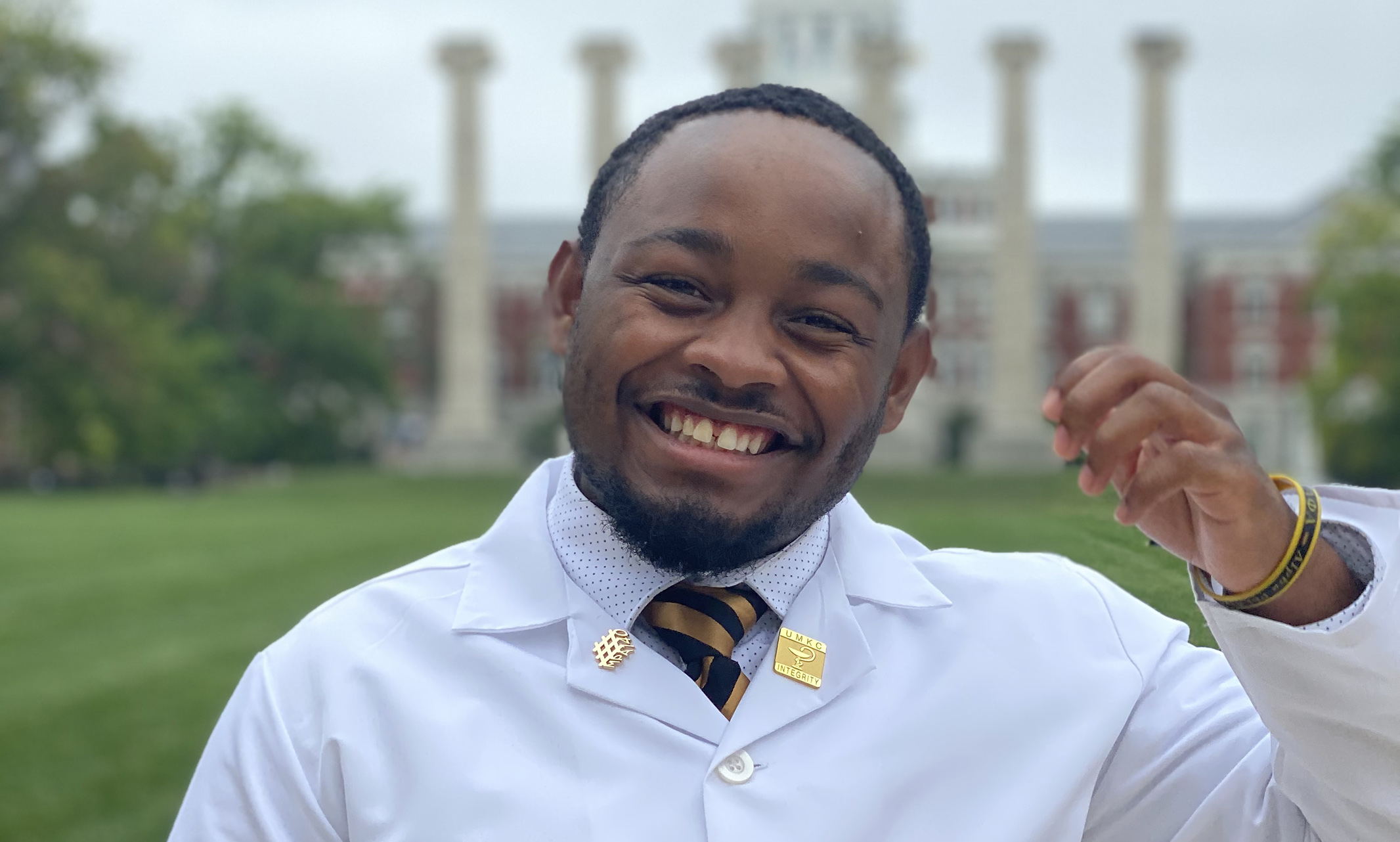
As School of Pharmacy recognizes Black History Month, it celebrates the accomplishments and contributions of the school’s Black community who are m...
Meet Daryl Whitehead, a third-year student at the UMKC School of Pharmacy, whose goal is to serve underrepresented and marginalized groups as a clinical pharmacist while also serving as a preceptor and mentor for future pharmacists.
Why did you choose the UMKC School of Pharmacy?
I originally selected UMKC as one of my top choices for schools to attend that had a respected pharmacy program while doing research when I was in high school. Of my top three choices, UMKC was closest choice to home and also offered a well-balanced price for the program I was looking for.
How have UMKC and UMKC School of Pharmacy embraced and supported you as a Black student?
Throughout my years as a student at UMKC, I have been offered numerous scholarship opportunities, the task of becoming an influential resident assistant and the chance to take part in numerous organizations on the campus such as UMKC's African American Cultivating Excellence (AACE) mentoring program, Alpha Phi Alpha Fraternity Incorporated, National Community Pharmacy Association, and Student College of Clinical Pharmacy. Becoming a resident assistant on campus my sophomore year of college allowed me to connect with so many residents between Johnson and Oak Hall, creating memories and long-lasting friendships along the way. Every organization on campus has allowed me to help bring student involvement opportunities to the campus and offered me the opportunity to travel to places like Canada and North Carolina which is always exciting and fun.
Why would you encourage prospective students from your background to consider the UMKC School of Pharmacy?
Whenever I encounter a student of the minority that wants to pursue a professional degree, my main encouragement is to keep going when things get tough. Whenever you feel tired, doubtful or even defeated remember who you are striving to be. Find your "Why" and use it as fuel to keep going. Whenever you do great, remember to celebrate it, embrace yourself and feel proud. Once you get to your end goal remember that you are a beacon to kids who grow up after you, and you are breaking generational barriers and inspiring kids at the same time.
What do you hope to do in pharmacy when you graduate and how do you feel the School of Pharmacy is helping prepare you for that?
As I get closer to becoming a pharmacist, I grow more interested in becoming an ambulatory care pharmacist. I aspire to work at a veterans affairs hospital in the future and I will pursue residencies to reach that goal. UMKC School of Pharmacy helps prepare students achieve their goals by offering Pharmacy Practice Experiences that expose students to different fields of pharmacy. There is also a good number of courses and electives available to help students as well. I look forward to graduation and becoming a pharmacist, it will be a huge achievement for not only me, but for my family and the friends I have back home that root for me. As the youngest of five boys, I am the first to graduate high school and pursue a college degree, a doctorate degree at that! It makes me happy to know that I am making a way for my nephews, nieces, little cousins, the kids in my neighborhood, and students I visit when going back to my old schools. There will be opportunities for me to bridge gaps in health care for the underserved community. Helping patients be more knowledgeable about their health and creating a trusted relationship with each individual I encounter.
Feb 15, 2022
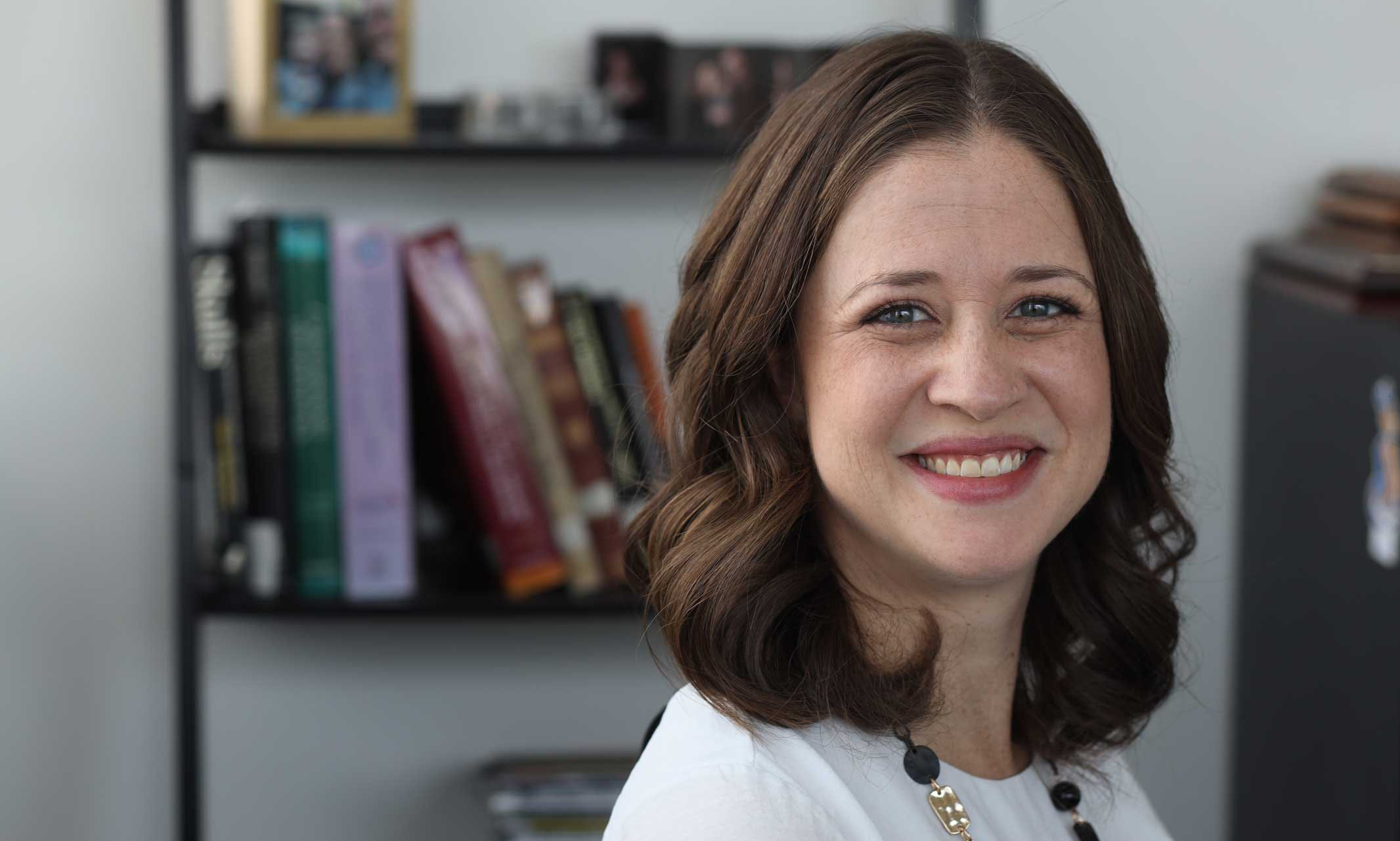
Mentorship is the fabric that runs through Erin Bumann’s work
From a fellowship to funding, big things will be happening in craniofacial bone development in the lab of researcher Erin Bumann, D.D.S., Ph.D., M.S. at the UMKC School of Dentistry.
Bumann is an assistant professor in the Department of Oral and Craniofacial Sciences. The primary goal of her lab is to identify nonsurgical methods to change the size and shape of the bones in the face in hopes that children either do not need to undergo surgery or need less invasive surgery to address craniofacial deformities.
Most recently, she’s received foundational funding from the Robert Woods Johnson Foundation, a philanthropic organization dedicated to public health. It’s especially meaningful for Bumann, whose grandfather is from Mexico, that the funding comes from the Harold Amos Medical Faculty Development Program. The program was created to increase the number of faculty from historically disadvantaged backgrounds and will offer four years of support for her research as well as opportunities to network with fellow scholars in the program including an annual meeting.
“I’m excited for the opportunity to have colleagues around me from similar backgrounds, having some difficult conversations,” said Bumann. “I’m looking forward to the opportunity to open up and have some honest conversations while also sharing resources and finding out what’s going on at other programs.”
Bumann has also been selected for the American Dental Association Gold Medal Fellowship. The award is only given out every three years to one individual nationally.
According to Bumann, her selection carries that much more weight because she was selected by one of her role models, Martha J. Somerman, D.D.S, Ph.D. Somerman was the first woman to win the ADA Gold Medal Award for Excellence in Dental Research. She is also the current past director of the National Institute of Dental and Craniofacial Research, an organization that has awarded Bumann a grant that enabled her to continue her research into jaw development in quail and duck eggs.
“Because of the pandemic I hadn’t had a chance to interact with her as much as in past years, so it’s been wonderful to catch up with her and reconnect,” said Bumann. “It’s really meant a great deal that someone with her breadth of experience looked at my body of work and saw it as impactful.”
Another opportunity that comes with the award is presenting her research as a continuing education course at the American Dental Association’s 2023 annual meeting.
“It’s such an important part of research, making sure that the research that we’re doing can directly impact patients,” said Bumann. “There can be a disconnect between dentistry and the research, so communicating with our clinical colleagues is so important and this is a great opportunity for that.”
Mentorship is an important part of Bumann’s work, not only as a mentee but also a mentor to others. “I’ve been really blessed all along my entire career path to have wonderful mentors,” she said. “Mentorship is a big part of what I enjoy and I think it’s so important to pay it forward."
Bumann is an active mentor for a number of groups on campus. She is a part of the Avanzando Mentorship Program, which is designed to support Latinx students on campus with individualized support in reaching their academic and career pursuits. She also mentors through the Students Training in Academia, Health and Research (STAHR) Partnership, collaborative program with the UMKC schools of medicine, dentistry and pharmacy. The program is designed to increase the number of students from disadvantaged backgrounds entering health care programs.
For Bumann’s time in the Harold Amos Medical Faculty Development Program, she’s excited to see where other schools have had success in their diversity programs. “I look forward to learning from colleagues at other schools and institutions who’ve already tried different approaches and finding out their best practices,” she said. “I’m hoping to bring some new ideas back with me to UMKC.”
Ultimately, one of the greatest gifts in mentorship for Bumann is seeing her mentees reach their ultimate goal at UMKC. “Last year, five of my past mentees – either from the STAHR program or my lab – all graduated,” she said. “To see that first cohort walk across the stage at Commencement was really special.”
Feb 15, 2022
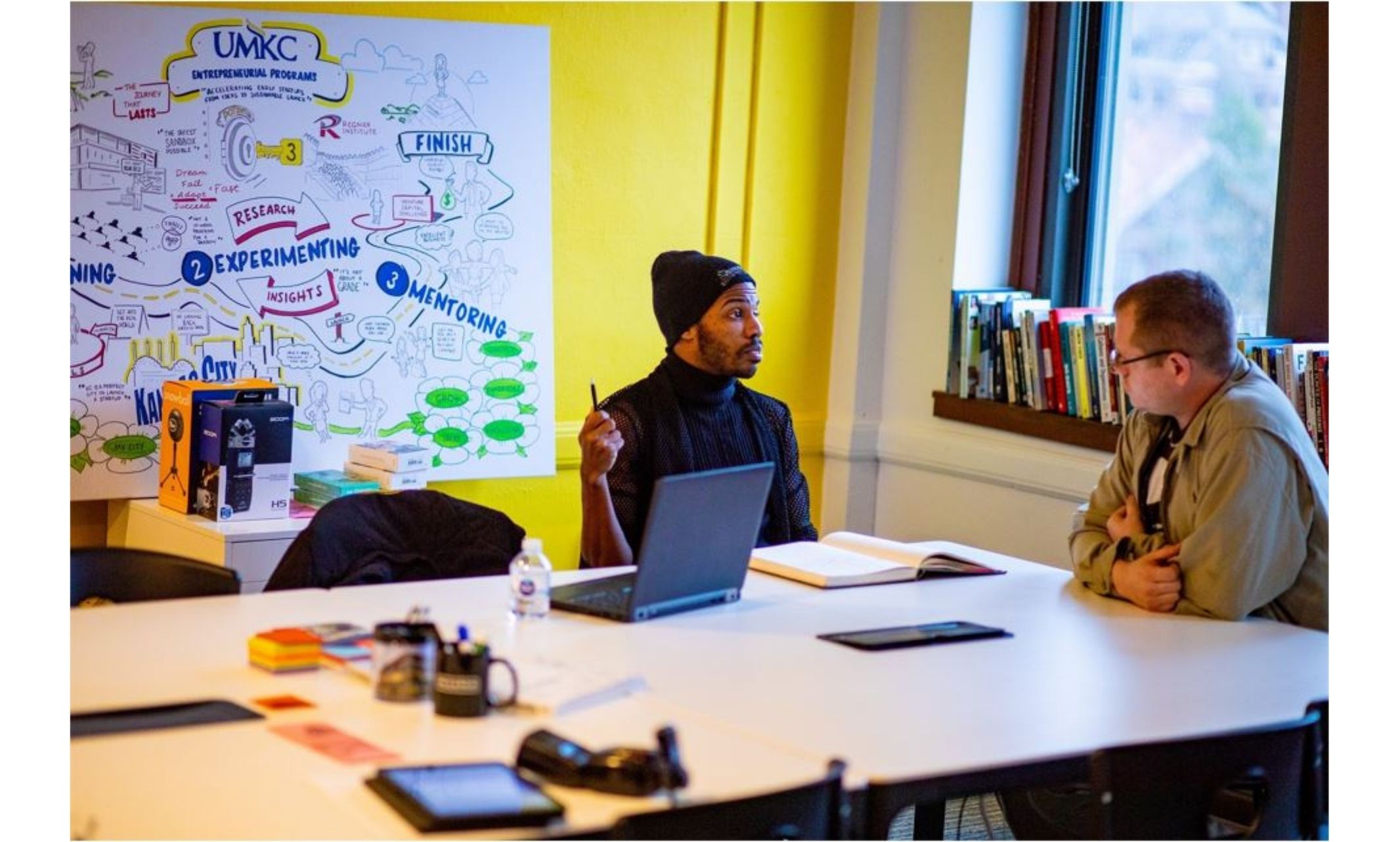
Innovative approach bundles support services to help students prepare for and secure high-paying careers
Earning a college degree is nice, but for most students, the end goal is to land a high-paying and rewarding career after graduation. UMKC is launching a new program to help students achieve that goal.
The University of Missouri-Kansas City is working to transform the higher education model by shifting the focus from degree attainment to career outcomes, offering an innovative approach to better prepare students to enter the workforce and land professional, high-paying careers. This bold new idea is part of the UMKC Forward initiative, a multi-year investment by the university to meet and exceed the demands of today’s college student.
The "Professional Career Escalators"SM (Career Escalators) program provides a unique set of specialized student supports designed to facilitate academic to career connections. Services include:
Career development
Mentoring by professionals in the community
Applied learning opportunities
Leadership development
Professional or grad school preparation
Applications are open now to land one of 200 spots in the inaugural Career Escalators class, which launches in Fall 2022. Incoming students and transfer students may apply for this program by submitting transcripts, a letter of recommendation and a short video that demonstrates a student’s character and desire to enter the program.
The deadline to apply is April 1.
The Career Escalators program is unique because of the way UMKC is bundling together such a robust collection of services for students. This program provides the support team, resources and peer collaboration needed to align a student’s academic journey with their future career goals.
“We are thrilled to launch this first cohort and blown away by the buzz this program is starting to generate,” said Mako Miller, M.A.Ed, director of the Professional Career Escalators program. “We’re really working to shift focus beyond the degree to the desired outcome of job readiness upon graduation. By starting post-college career planning earlier and aligning those plans with job shadowing opportunities and mentorship, our graduates will be more prepared, confident and successful in their careers.”
An added financial benefit makes this program even more appealing. Career Escalators students can choose between a $2,500 annual on-campus housing scholarship, or $1,500 applied toward the cost of tuition. Participants also have the option to live in a living/learning community with other students in the program. Just like professional networking, this living/learning model promotes building connections, and adds yet another layer of similarity between academic life and the workforce.
Apply today
Feb 15, 2022
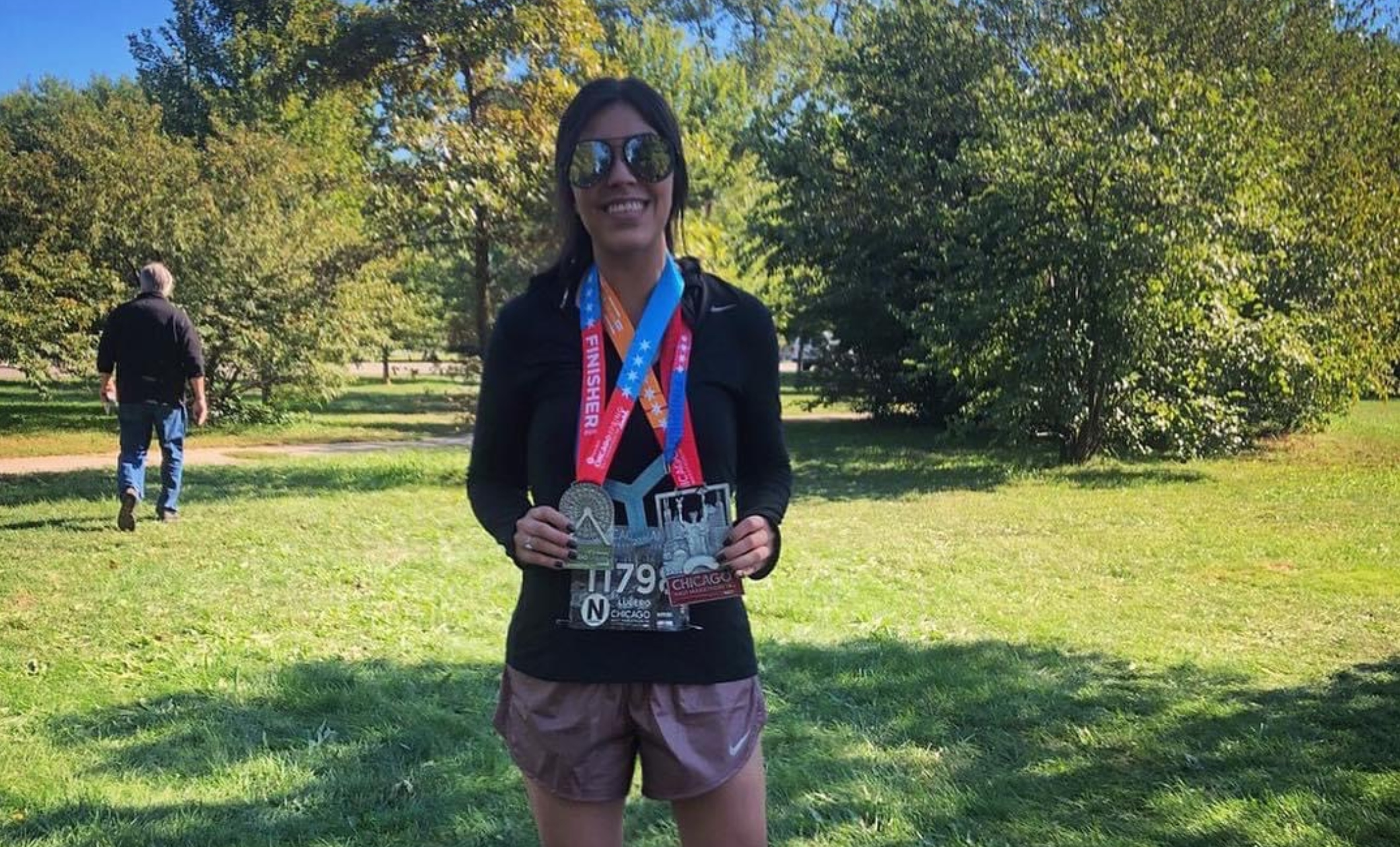
UMKC School of Education selects Lucero Garibay to receive Alumni Award
Each year, the UMKC Alumni Association recognizes the achievements of outstanding alumni with an awards celebration. UMKC is honoring Lucero Garibay (M.A. ’16) with its Class of 2022 School of Education Alumni Achievement Award.
While it would have been natural for Lucero Garibay, a Chicago native, to stay closer to home to pursue her graduate degree in mental health, she chose to attend UMKC. Although she knew no one at the university when she applied, the school’s mission, that includes “meeting the varied psychological, social, and educational needs of individuals, couples and families in diverse urban communities,” aligns with her personal mission of giving back to her own community.
Garibay returned to Chicago and is a successful psychotherapist with Pilsen Wellness Center, an organization that focuses on culturally sensitive approaches in their services to support family relationships, community empowerment and economic development.
How has your cultural heritage and being bilingual impacted your career working so closely with people?
Being bilingual is a beautiful part of my identity in and of itself, but it also serves as an invaluable resource in the mental health field. There already exists a shortage in mental health services across the field. There is an even more severe shortage of mental health providers that are able to fully comprehend the cultural and language barriers faced in so many of our communities. Visibly being witness to the ease that clients exude when they are paired with a provider whom, not only shares their cultural heritage but also speaks the language they are most comfortable with, is an experience truly difficult to put into words. I am inherently grateful.
How do you manage the challenges of working with individuals going through trauma?
Holding space for others’ trauma and emotional pain on a daily basis is not something one becomes accustomed to. I have worked hard towards learning how to take care of myself in order to provide the best possible care for my clients. One of the most difficult lessons faced in the early days of my career was learning not to take certain things home with me. Some days are heavier on the heart than others. I check in with myself on my way home from work, ask for space if I need it, and do something kind for myself.
What is your favorite UMKC memory?
Most of my favorite UMKC memories can be attributed to the home I found within UMKC Residential Life. I served as an assistant residential life coordinator at Johnson Hall for two years. Being part of the team at Residential Life granted me a support system that I would have otherwise felt lost without in Kansas City. I remain friends with many of the colleagues I worked alongside with to this very day. I could never thank them enough for the emotional support they and the department provided me with as I pursued my graduate degree, far from the comforts of Chicago.
What advice do you have for students who’d like to follow in your footsteps?
Keep your mind and options open. Some of us continue working within the settings and populations that call out to us when we are in school. However, many of us will find an entirely different setting or population to pour our passions into. Second, compassion fatigue is a very real thing. Don’t let your pursuits in the healing of others take you along with it. Take care of yourself. Your clients will thank you for it.
About the Alumni Awards
Join us in honoring Garibay and the other Class of 2022 awardees at an in-person celebration at 6 p.m. April 29, at the James C. Olson Performing Arts Center. To register, visit UMKC's Alumni Association website. If you are unable to attend the event but would like to donate to student scholarships, contributions can be made online.
Feb 14, 2022
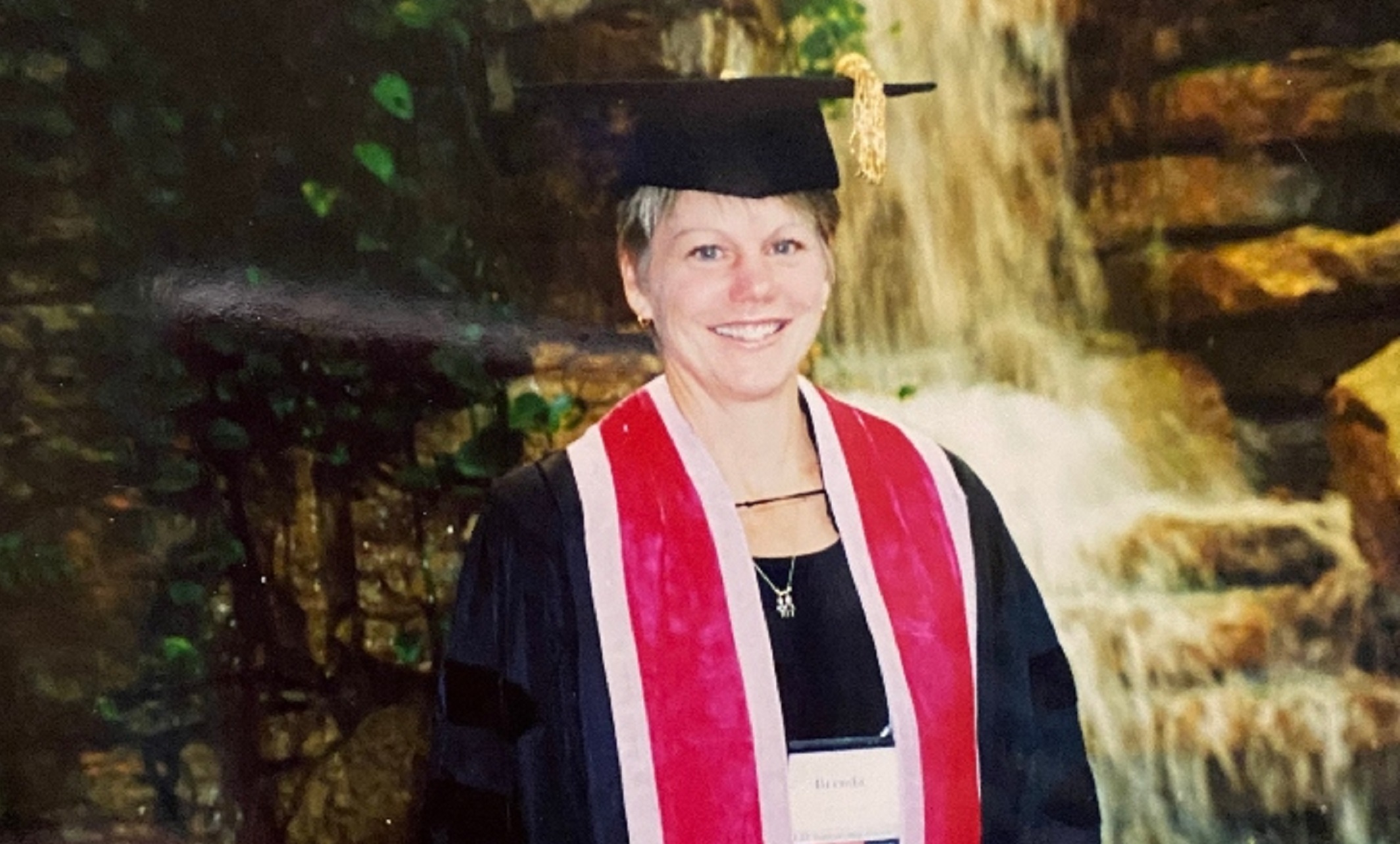
UMKC School of Dentistry selects Brenda Bohaty to receive Alumni Award
Each year, the UMKC Alumni Association recognizes the achievements of outstanding alumni with an awards celebration. UMKC is honoring Brenda Bohaty (Ph.D. ’09) with its Class of 2022 School of Dentistry Alumni Achievement Award.
What drew you to dentistry? And what made you want to work with children?
I grew up in a small rural town in Nebraska and my dentist was literally “a jack of all trades.” He really did it all…surgery, restorations, everything. I really admired him and enjoyed going to the dentist. I had some complicated treatment needs with impacted teeth and so my case was not easy. He made me feel comfortable no matter what I was having done.
As the director of the residency program for up-and-coming dentists at Children’s Mercy, you work closely with your profession’s newest cohorts. How will pediatric care look different for them than it did when you first began?
The love for children and our desire to help them never changes. We are faced with managing many more children with special health care needs as more children survive catastrophic diagnoses and continue to live meaningful lives.
Our focus and commitment in areas of healthcare inequities will also be expanded. Although we have talked about barriers to care for a very long time, leaders in dentistry will need to expand our response and work together to ease the many barriers faced by those in need. Finally, the number of children who experience adverse childhood experiences continues to increase and our focus on training dental students and advanced training students in trauma informed care will be very important.
What is the impact of your work with Operation Breakthrough and the Lowry Clinic having for young kids?
The Lowry Clinic Program at UMKC was established with a trust more than 60 years ago to pay for care for children in urban Kansas City. The money from the trust is gone, but UMKC continues to make the program a priority and provides care to approximately 150 children each year. What an impact we have on the oral health of these kids! The Operation Breakthrough program is similar and has been a win-win for our students and patients alike.
What advice do you have for students who would like to follow in your footsteps?
Work hard and love what you do! Embarking on an academic career in dentistry was not something I was interested in pursuing initially, but I was guided by awesome mentors like Dr. John Haynes (B.S., ‘56, D.D.S., ‘60, M.A. ’71) and James Lowe (D.D.S., ’65, M.S. ’69) I loved practicing dentistry, but the combination of teaching and practicing was a perfect mix.
About the Alumni Awards
Join us in honoring Bohaty and the other Class of 2022 awardees at an in-person celebration at 6 p.m. April 29, at the James C. Olson Performing Arts Center. To register, visit UMKC's Alumni Association website. If you are unable to attend the event but would like to donate to student scholarship, contributions can be made online.
Feb 14, 2022
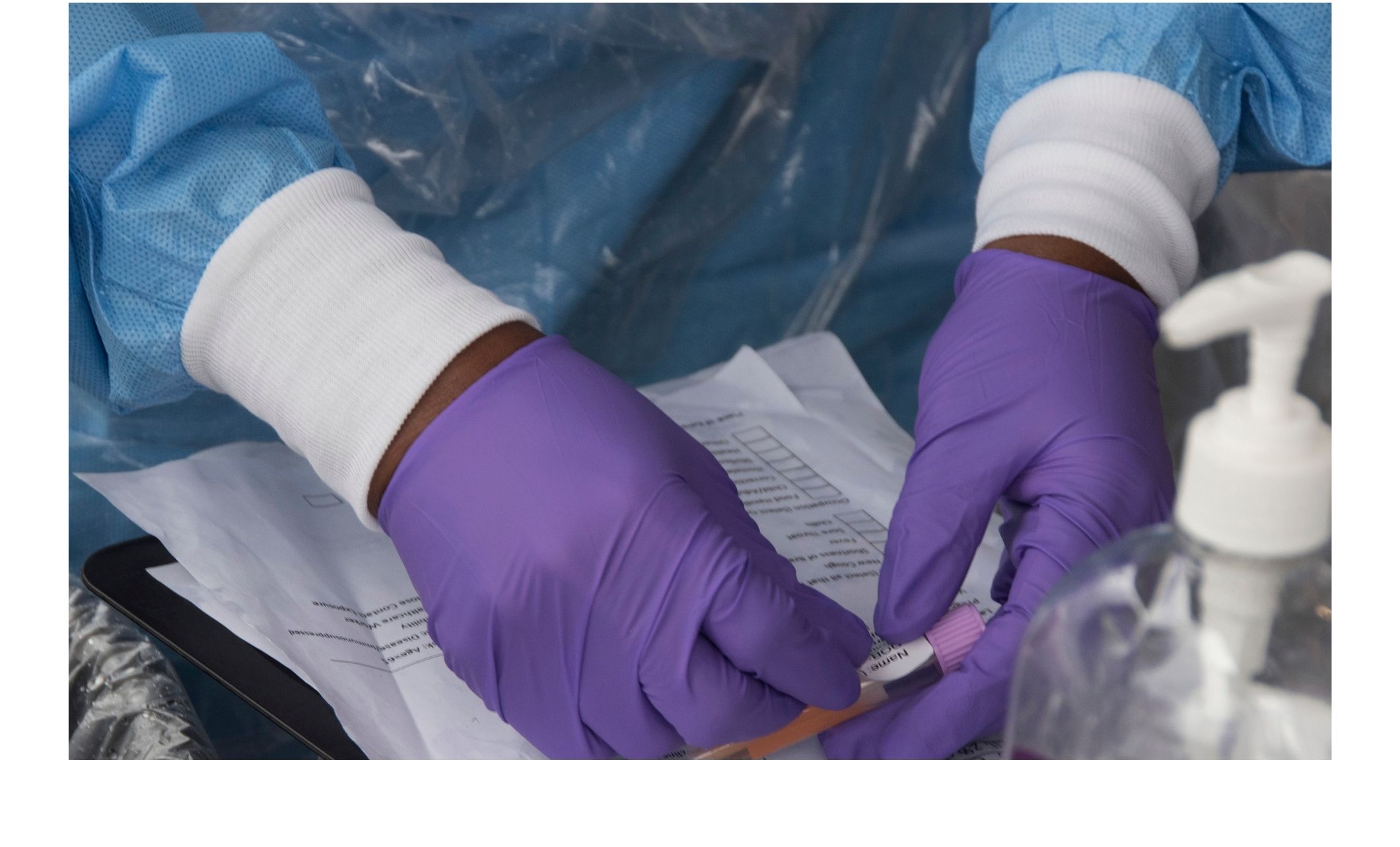
Open to general public and university faculty, staff and students
Quick and convenient on-campus resource makes it easier to know your health status and take precautions.
Covid-19 testing shortages felt across the country have threatened the university’s ability to monitor the spread of Covid-19. In response to an increased demand for COVID-19 testing options, UMKC has partnered with the testing company Curative to host an on-campus testing site. University leadership hopes that providing this quick and convenient resource on campus will encourage awareness and increased vigilance as we continue to fight the spread of COVID-19 and its variants.
A mobile testing unit is set up at 5050 Oak Street in the empty lot on the north side of Pizza 51. The testing facility is open Monday - Saturday from 8:30 a.m. to 4:30 p.m. Curative staff will conduct shallow nasal PCR tests with results expected one to two days after the lab receives the sample. Appointments are preferred, but not required, for students, faculty and staff, as well as the general public. You can book an appointment here beginning Feb. 16.
Testing is free, but those with insurance will be asked to provide policy information for Curative to submit to a patient’s insurance company. Insurance is not required for testing. The testing site will run through May 2022.
“This on-campus testing site is the latest benefit in a continued and ongoing effort to bring in-demand resources to our UMKC community and surrounding neighborhoods,” said Mauli Agrawal, chancellor. “These precautions have allowed us to successfully return to campus this spring and will be key to our continued success in having another productive semester.”
In addition to the testing site, UMKC will continue to host on-campus vaccination clinics for members of our campus community and the general public, in partnership with the Samuel U. Rodgers Health Center. The clinics will be held at the Student Union in the Jazzman’s Café and Bakery Stage Area at the following dates and times:
Feb 15: 1-5 p.m.
March 1: 1-5 p.m.
March 15: 1-5 p.m.
April 5: 1-5 p.m.
May 3: 1-5 p.m.
Latest Covid-19 Information from UMKC
Feb 14, 2022
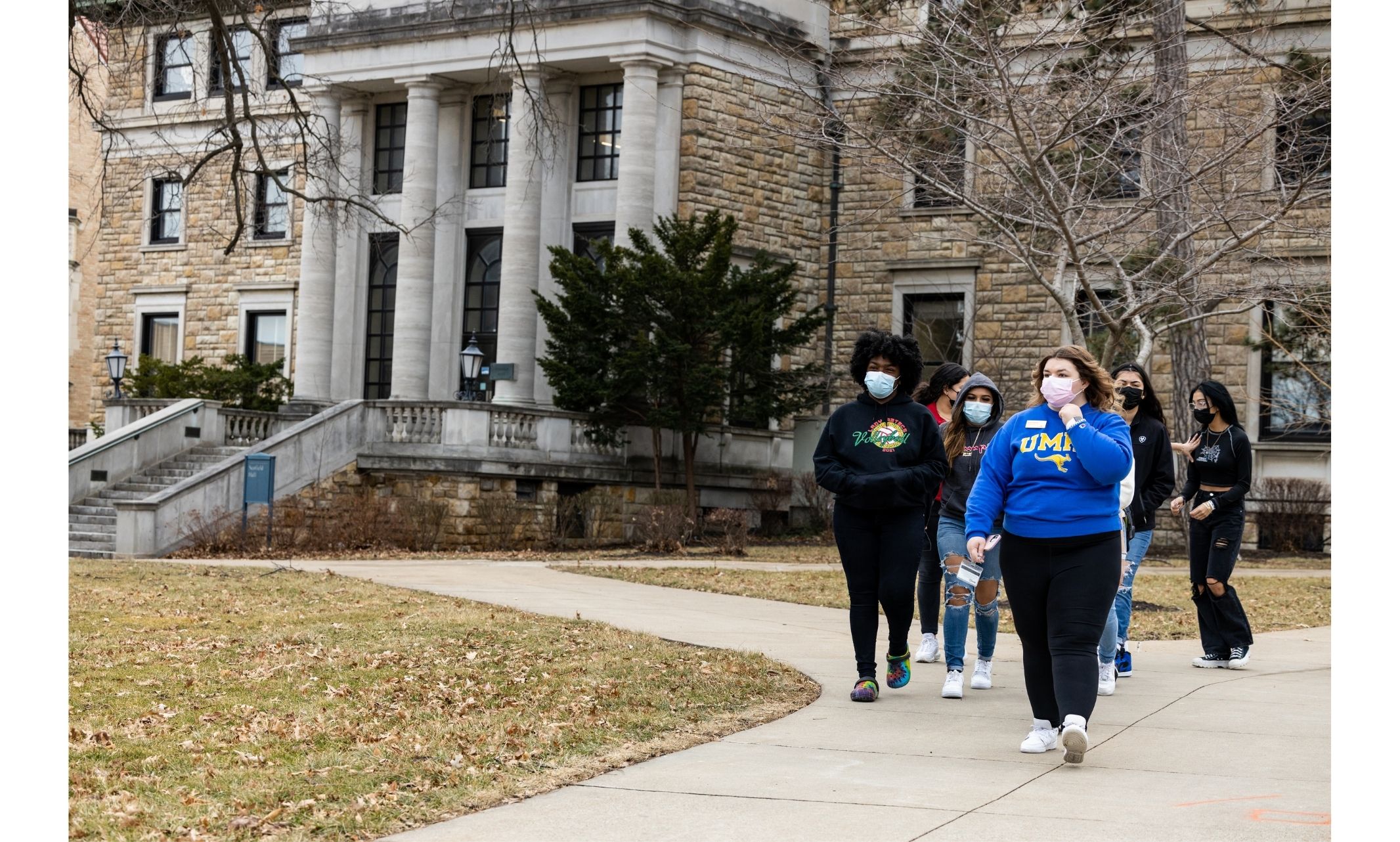
Recently launched "Professional Career Escalators" program prepares students to go beyond the degree
Sophomore students attending Guadalupe Centers High School visited UMKC’s campus to learn about its culture, programs and degree options.
The group of about 35 students are participants in their high school’s college prep program called Early Escalera. It works with students to prepare for college earlier in their high school careers. Early Escalera is the high school equivalent to UMKC’s "Professional Career Escalators"SM, or Career Escalators, program that prepares college students to start thinking about careers from the minute their university experience begins.
Chancellor Agrawal welcomed the students to the university shortly after their arrival on campus. He explained the benefits of UMKC’s new Career Escalators program, a cohort style learning model that encourages students to align their academic journeys with future career goals in mind and supports students with a unique collection of bundled services, resulting in memorable experiences and powerful connections to help students land high-paying careers upon graduation.
“Your program takes you through the early steps of getting to college, ours takes you through getting a degree to a successful and fulfilling career,” said Mauli Agrawal, chancellor.
The chancellor went on to give an overview of UMKC’s degree programs, including two new degree options launching in the fall of 2022 before bidding the students farewell as they ventured out around the Volker Campus for a tour.
“My two favorite spots on campus are the basketball courts and our iconic Roo statue,” said Agrawal. “Be sure to keep an eye out for those spots during your tour and take time to take a picture yourself and post it.”
According to the National Register for Historic Places, Guadalupe Centers is the longest continuously operating agency serving Latinos in the United States. Guadalupe Centers’ educational programming dates back to the 1980’s, expanding from 15 students who learned in the basement of a neighborhood church to now serving over 1,000 students in Pre-kindergarten through high school. The Early Escalera program at Guadalupe Centers High School (GCHS) aims to make sure students graduate, go to college and find continued success.
Uzziel Pecina, assistant teaching professor in the UMKC School of Education, welcomed the group and shared a unique connection to their school.
“Benvenidos, somos familia,” Pecina said, before explaining his role at UMKC’s school of education.
Students were surprised and delighted to learn Pecina is a former principal of Alta Vista High School, which is known today as Guadalupe Centers High School. He went on to share deep familial ties to GCHS – Pecina has a sister who is a GCHS counselor, a brother who taught art there, one nephew who graduated from GCCHS and another who is a current middle school student.
“The culture here at UMKC is unmatched. We have more than 300 student organizations and a culture of support and inclusion,” Pecina said. “Ask questions, introduce yourself to people and make connections as you lay the groundwork for your future college careers.”
Apply to Career Escalators
Feb 11, 2022
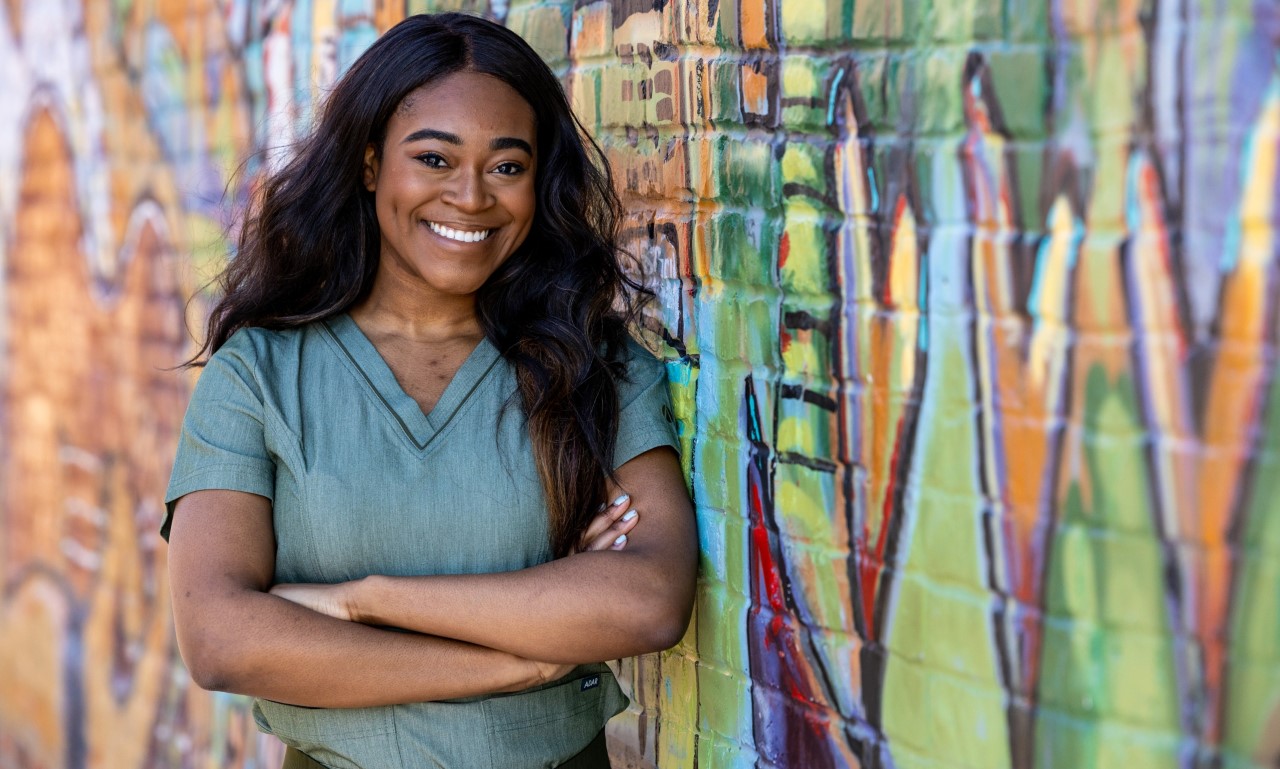
Dumebi Okocha leverages her unexpected ‘medfluencer’ platform for good
Roos don’t just dream, they do. Our students turn ideas into action every day. Get to know our people and you’ll know what UMKC is all about.
Dumebi OkochaAnticipated graduation year: May 2024UMKC degree program: B.A./M.D.Hometown: Waxhaw, North Carolina
As the daughter of a physician and a nurse practitioner, pursuing a medical career was a natural path for Dumebi Okocha.
"I always saw my dad coming back from work and I was always interested in the cases he was seeing, even though I didn’t know what he was talking about. My mom is a nurse practitioner, so I come from a strong health sciences background,” she said. She applied to UMKC because of its six-year accelerated B.A./M.D. program, which would allow her to become a physician faster and save money. When she found herself stuck at home during the COVID-19 pandemic, Okocha did what many people her age do when boredom strikes: she made a TikTok video. She noticed there was not much awareness about accelerated medical programs like hers, so posted about it. “I was just trying to show there were other, quicker, more cost-affordable options without the MCAT,” she said. To her amazement, it racked up more than 50,000 likes. “I was surprised. I just didn’t think anything of it at the time. When I started, I probably had 30 followers,” she said. “I was like, ‘Who are all these people?’ That’s when I was like, okay, if I post consistently, I think I can get a following.”
Soon her inbox was flooded with direct messages from students who had never heard of accelerated programs. It was then that Okocha saw an opportunity to change the face of medicine. She decided to expand her platform to talk about the medical field more broadly and encourage other people who are Black, first-generation Americans, first-generation college students or an under-represented minority to pursue medical careers, no matter if they chose a six-year track or another path. “My goal overall is to be a face for what is possible and to use my privilege to help those who are not as privileged,” said Okocha. “Once they see a Nigerian-American girl in medical school doing her thing, I think it helps them say, ‘Okay, she’s doing it. She’s not perfect but she’s doing it, which means I can do it. I just have to find my way to success.’” Okocha has since expanded her reach, with her highest-viewed video now reaching one million views. At first, she was nervous about her classmates and professors seeing her videos, but she says the feedback has been largely positive. “I was getting too self-conscious thinking that if people are watching, I had to be perfect. But once I heard from administration that they liked my TikToks, I knew I was doing a good job,” she said. In addition to being a medfluencer, Okocha is a UMKC School of Medicine ambassador, Region 2 secretary and the local chapter secretary of the Student National Medical Association, public relations representative for the OBGYN Interest Group and a member of Students Training in Academia, Health and Research (STAHR). Between her studies and her extracurricular commitments, Okocha said her social media presence can be a lot to balance, but she tries to keep things in perspective.“I have to remember this is not my job, this is a hobby. When I place it like that, it’s not an obligation, it’s just for fun,” she said. “I think I laid the expectation that I’m not going to post every day and that’s okay. Around finals, I don’t really post. If I’m changing classes, I tend not to post in the beginning just so I can get my footing. I always put being a student first.”
Through it all, Okocha said she has learned how to manage multiple tasks, find creative solutions and appreciate all the professions of medicine. She hopes by sharing her journey, it will inspire others. “You can have a life, you can go to med school and even if you have disadvantages stacked against you, there are ways around it, you just have to know those ways.”Okocha said she plans to continue and expand her social media presence when she becomes a doctor. “I feel like social media is the new way of getting information out to your patients and educating people,” she said. “My dream is to have a podcast. After I take my boards, I want to start working on that.”
Feb 09, 2022
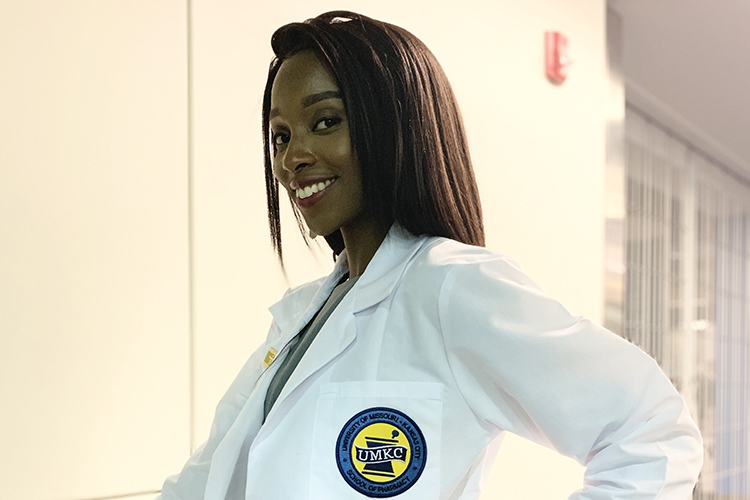
As School of Pharmacy recognizes Black History Month, it celebrates the accomplishments and contributions of the school’s Black community who are m...
Meet Dasjah Mason, a fourth-year student at the UMKC School of Pharmacy, whose goal is to serve underrepresented and marginalized groups as a clinical pharmacist, while also serving as a preceptor and mentor for future pharmacists.
Why did you select UMKC School of Pharmacy?
I moved to Kansas City because I wanted to pursue a career in pharmacy and track and field. I was blessed to receive a scholarship for the women’s track and field program, so it was a no brainer to stay here for pharmacy school. Several pharmacists I knew graduated from UMKC and said they felt they were prepared to pass boards and move on in their career after graduation.
How have UMKC and UMKC School of Pharmacy embraced and supported you as a Black student?
The UMKC School of Pharmacy has embraced and supported Black students in several ways over my last few years. Namely establishing the Black Student Pharmacists Organization and working with its members to create a network with other Black alumi. Also, faculty actively participate in the Students Training in Academia, Health, and Research (STAHR) Program. The STAHR program is aimed towards retention and graduation of students from economically and educationally challenged backgrounds. Faculty provided mentorship through several workshops, one-on-one meetings and being available to their students daily. Through this experience, I was able to create strong relationships that help me develop professionally and personally.
Why would you encourage prospective students from your background to consider the UMKC School of Pharmacy?
I would encourage prospective students to consider UMKC because its current students are working to create a network to recruit and retain Black students and serve its surrounding community.
What do you hope to do in pharmacy when you graduate and how do you feel the School of Pharmacy is helping prepare you for that?
After graduation, I wish to complete PGY1 and PGY2 residencies in a specialized area of interest then become board certified. After completion of my residency training, I plan to maintain a clinical practice while having a role precepting and mentoring pharmacy students and residents. Moreover, another passion of mine is serving underrepresented and marginalized groups. Therefore, I believe a residency experience would equip me with clinical skills on acute and chronic disease states to use towards patients who tend to have significant disparities that interrupt their health care. I believe the UMKC SOP has prepared me well for residency. Throughout my rotational experiences, I feel stronger in my abilities to be a clinical pharmacist and I think that stems from my strong baseline knowledge gained in the classroom.
Feb 09, 2022
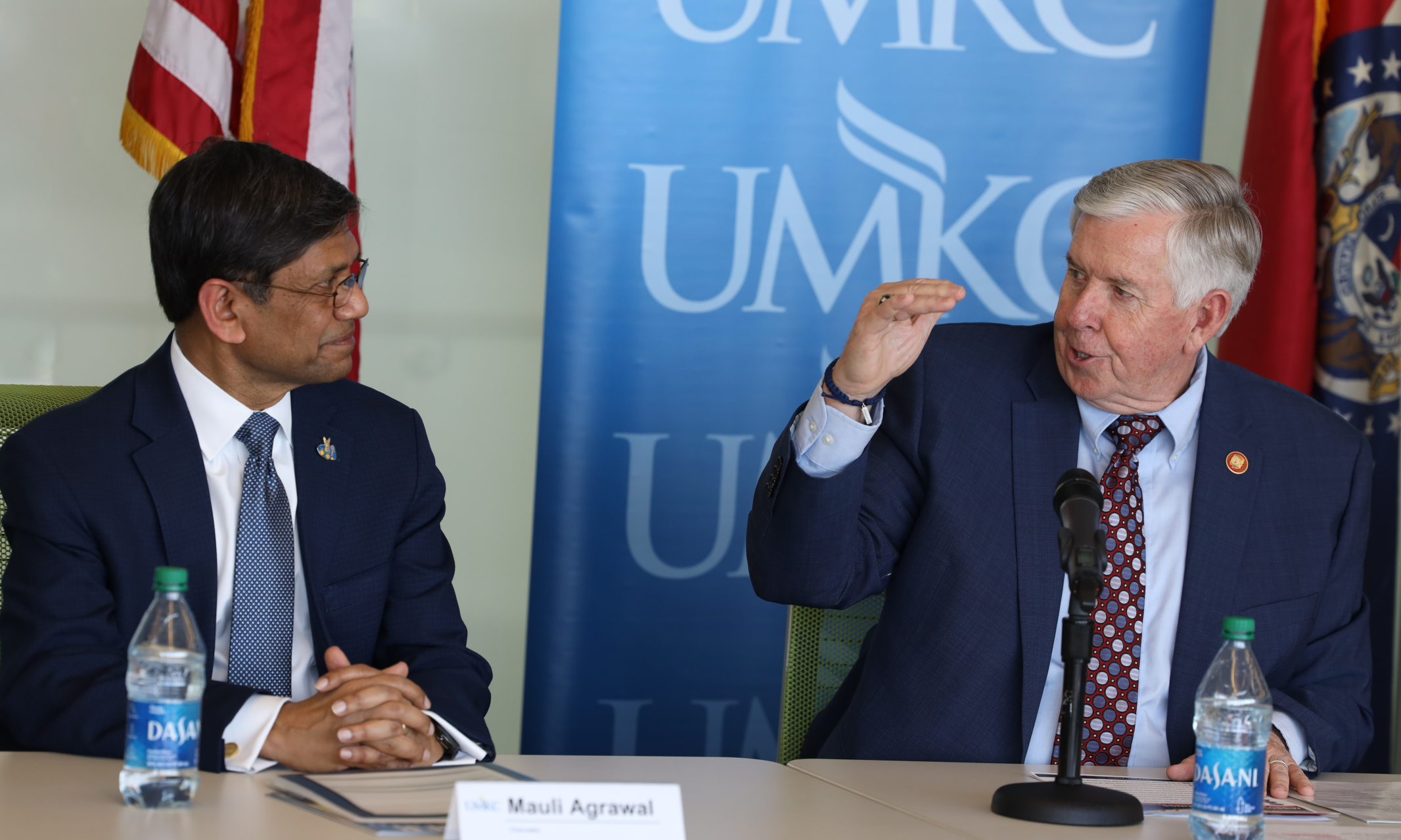
The governor discussed "building the foundation" for important partnerships
Governor Mike Parson visited the University of Missouri-Kansas City to host a roundtable discussion with greater Kansas City community leaders on higher education and workforce development. It's the first time this governor has visited campus.
The governor’s discussion focused on the importance of partnerships for workforce development between K-12 institutions, higher education and the private sector.
“When I first became governor, improving infrastructure and workforce development were the two main goals. I knew the only way I could do that was to partner with K-12 and to partner with higher education,” Parson said. “We are building the foundation of that right now.”
C. Mauli Agrawal, UMKC Chancellor, noted several programs the university has to help bridge those gaps, including a new signature program - Professional Career Escalators. Launched this year, the escalators allow students to include applied experiences to their degree programs, like internships or service learning.
“From the time they start classes, this program will help students focus on their career dreams, and not just getting a degree. That will drive workforce development long-term,” Agrawal said.
Some members of the roundtable consisted of:
C. Mauli Agrawal, UMKC Chancellor
Jenny Lundgren, Provost
Kevin Truman, Dean of the School of Computing and Engineering
Mary Anne Jackson, Dean of the School of Medicine
Steven Haas, Dean of the School of Dentistry
Charlie Shields, Vice-Chair UMKC Board of Trustees and CEO of University Health
Scott Boswell, President of UMKC Board of Trustees and President of Commerce Trust West Region
Ramin Cherafat, Chair of the Greater KC Chamber and UMKC Board of Trustees
Joe Reardon, CEO Greater KC Chamber
Kimberly Beatty, Metropolitan Community College Chancellor
Mark Bedell, Superintendent of Kansas City Public Schools
During his 2022 State of the State address in January, Parson released his budget recommendations for Fiscal Year 2023, which included a recommendation for a 5.4% increase in the core budgets of high education institutions and is proposing $265 million for capital projects across all four of the University of Missouri institutions.
“I would like to thank you for your steadfast support of higher education and understanding of the critical role that public universities play in preparing the workforce,” Agrawal said.
If the total amount of Parson’s recommended funding for higher education is included in the budget, Agrawal said UMKC plans to use its portion to help expand the university’s Health Sciences District, which is home to the School of Dentistry, Medicine, Nursing and Health Studies and Pharmacy.
Combined with UMKC’s partnership with University Health that is already in place, this project would bring billions of dollars to the region, create jobs, propel research and solidify our place among the region’s top healthcare institutions.
“This will make UMKC the premier academic health center,” Agrawal said.
Feb 09, 2022
Former economics department chair Stephanie Kelton recently spoke to the New York Times
Kelton spoke about Modern Monetary Theory and the test that the COVID-19 pandemic has put the theory through. Read more.
Subscription required
Feb 08, 2022
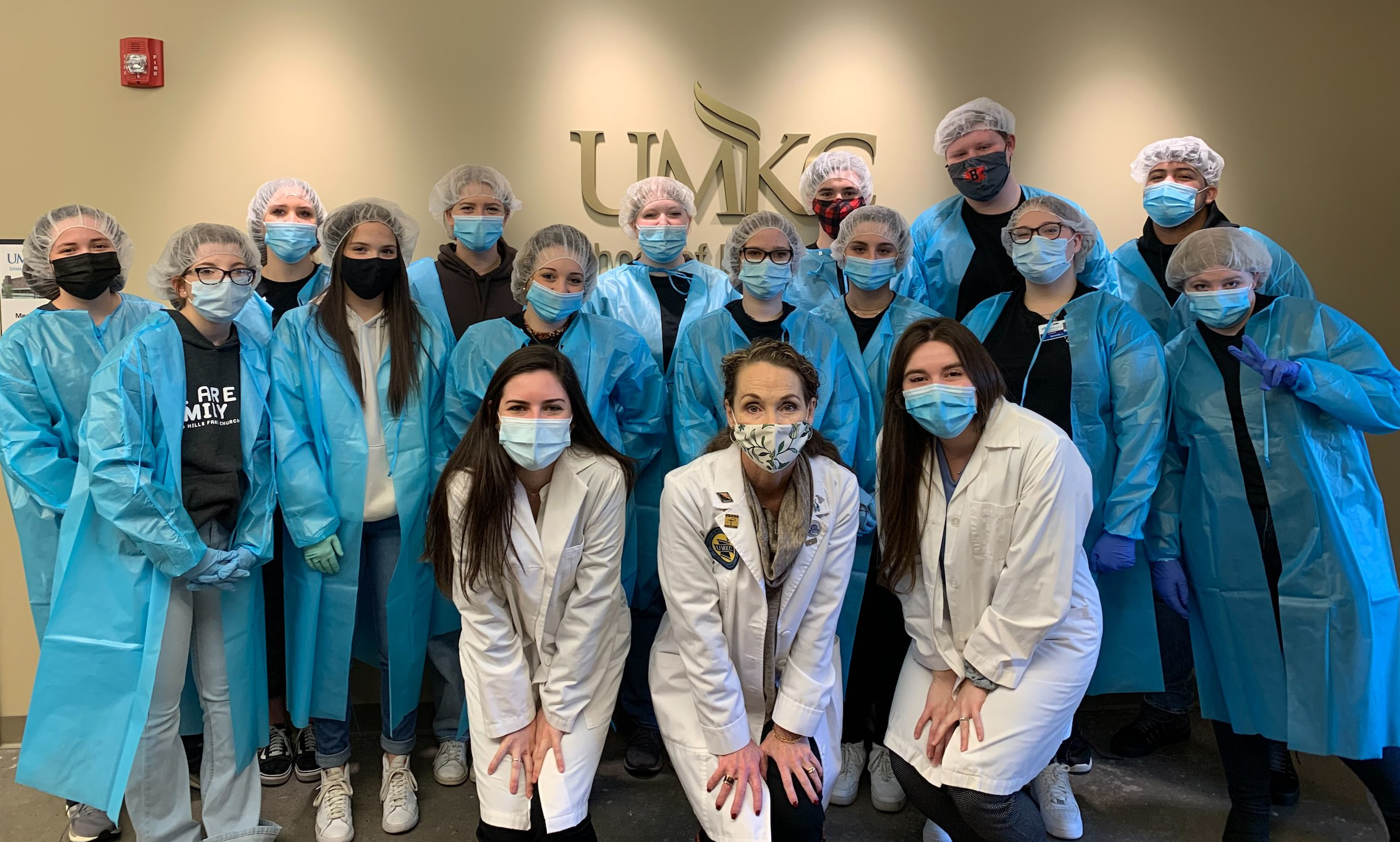
High school students are learning the roles of the pharmacist within the health care team through a career exploration program with Heather Lyons-B...
Each January, Heather Lyons-Burney, Pharm.D., welcomes a group of area high school students to visit her laboratory at the UMKC School of Pharmacy’s Springfield campus. For two and a half hours, the students take part in an experience of chemical compounding and discuss the role of non-sterile compounding to meet the unique needs of patients.
The students are part of the Greater Ozarks-Centers for Advanced Placement (GO-CAPS) program. Throughout the year, they will meet monthly with Lyons-Burney, and often one of her UMKC pharmacy students, to learn about a pharmacy topic and engage in pharmacist-like activities.
GO-CAPS is a career exploration program that partners with businesses throughout Missouri’s greater Ozarks area. It offers high school juniors and seniors an educational opportunity driven by real-world, career-oriented experiences. For those interested in health care, particularly pharmacy, there is Lyons-Burney.
“My goal is for the students to understand the role of the pharmacist on the health care team and how pharmacists impact patient outcomes,” she said. “Whether or not they decide to be a pharmacist, I want them to feel comfortable reaching out to the professionals who are the medication experts. I enjoy working with these motivated students, helping them explore various occupations in health care and how we work best as a team.”
As part of their high school curriculum, GO-CAPS students participate in a program of shadowing, attending classroom presentations, participating in various pharmacy projects and ultimately developing their own capstone project.
Lyons-Burney is part of the area-wide GO-CAPS program and serves on the advisory board as a resource for learning experiences and on-site ambulatory care clinic shadowing. The program provides a packed schedule of exploring a wide spectrum of the health care field including learning to perform CPR and emergency first aid with paramedics, how to set a fracture with an orthopedists and gaining a greater understanding of medical technology.
As a pharmacist, Lyons-Burney leads the high school students, currently a class of 16, in exploring the various areas of health care where one might find a pharmacist and provide them with clinical examples of the many roles today’s pharmacists play.Their classroom and laboratory sessions touch on lessons such as how pharmacists intersect with patients in addressing social determinants of health to clinical discussions on the complications of diabetes, such as neuropathy, and how to conduct a mono-filament foot exam to assess the loss of one’s sensation. Students also break into teams to work on and present patient cases.“My focus is to explore the roles of pharmacists in various settings by walking the high school students through a topic discussion of a disease state and discuss how a pharmacist in a hospital, long-term care setting, specialists office, primary care clinic or community pharmacy may be involved with patient care and the health care team,” Lyons-Burney said.She said that much of the pharmacist’s role in patient care involves considering options for therapies and whether or not those therapies will be safe and effective for a patient.“To demonstrate that process, it’s easiest to put the student somewhat in the seat of a pharmacist and have them think through a patient case to come up with a safe, effective option,” she said.Lyons-Burney said that by exploring multiple health care professions, including pharmacy, students in the GO-CAPS program may wind up going into a profession they might never had considered before.“Regardless of the health care profession that the students choose, this provides them with skills and knowledge that gives them a head start,” she said.
Feb 08, 2022
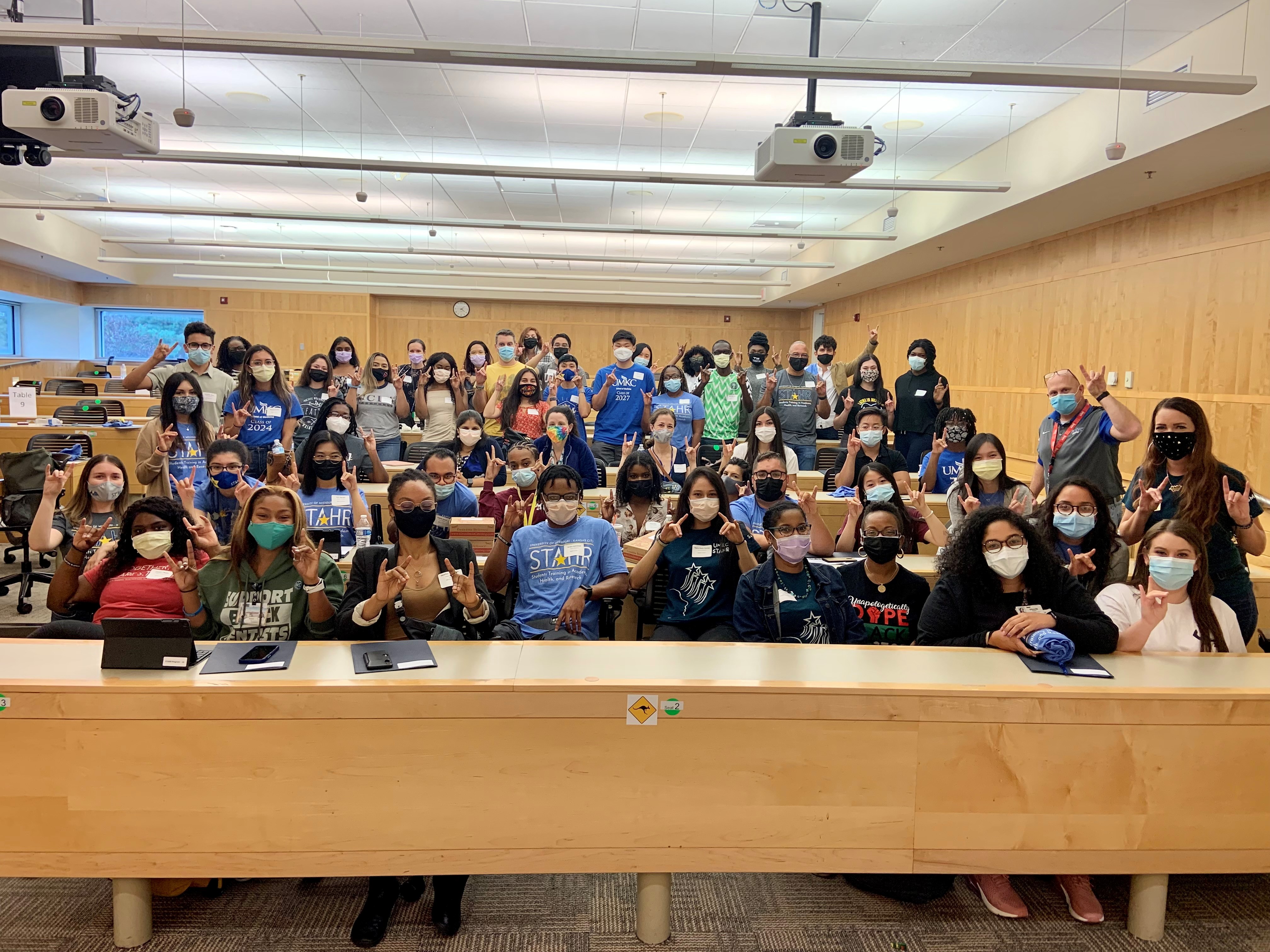
Collaborative seeks to increase the number of students from disadvantaged backgrounds entering health care programs and better prepare them for suc...
Sayra Nieto Gomez realized there would be challenges as an underrepresented minority student at the UMKC School of Medicine. More important, the fourth-year med student also discovered a program that has helped her, and others like her, rise to meet the challenges that many underrepresented minority students deal with in the health care field.
The Students Training in Academia, Health, and Research (STAHR) Partnership is a collaborative of the UMKC schools of medicine, dentistry and pharmacy. The program is designed to increase the number of students from disadvantaged backgrounds entering health care programs and better prepare them for success academically and professionally.
Sayra Nieto Gomez
“As a student, the STAHR program has provided a safe environment for me to be myself and to learn from students and physicians facing similar challenges,” Gomez said. “The most impactful thing that I’ve gained from this program is knowing that challenges persist through a person’s career. But as students and future physicians, we learn to adapt and grow from those challenges.”
STAHR is a two-pronged initiative that was started in 2018 to build and expand on the medical school’s highly successful high school Summer Scholars program and the dental school’s Admissions Enhancement Program.Today, in addition to a greatly expanded scholars program that offers multiple tracts for high school and college students to learn about and prepare for careers in health care, STAHR encompasses an ambassador program that provides current UMKC health professions students with meetings and mentorship opportunities. Ambassador workshops take place several times a year to help students learn and develop pertinent skills such as overcoming self-doubt and develop strategies to achieve academic success.It’s also vital in helping students create a community of like-minded peers, said Scott Guerrero, director of the STAHR program.“We use the Thomas Principles that focus on academic support, psychological support, identity development, leadership, sense of belonging and professional development,” Guerrero said. “Our first workshop was on academic support where we talked about what it means to be academically successful and how to overcome challenges in the classroom or within their setting.”A November workshop focused on mental health and wellness and how to cope with the stress of being a health professional student and burnout.
Natinael Mamo
“Being part of the STAHR program has helped me get to this point in my pharmacy degree,” said fourth-year pharmacy student Natinael Mamo. “The most impactful thing for me has been the numerous resources introduced to help me attain my academic and professional goals.”He’s not alone. Students from economically and educationally disadvantaged backgrounds typically succeed in attending and completing health professions degree programs at a far lower rate than students from strong schools in thriving communities. But at UMKC, as many as 150 students and more than 130 staff and health professionals across the UMKC Health Sciences Campus and community are participating in the STAHR Ambassador and Scholars programs that are changing that dynamic.Now in its fourth year, STAHR initially received a five-year $3.2 million grant from the United States Health Resources and Services Administration. Guerrero said he will soon be applying to renew the grant while also working on other sustainability efforts.In the meantime, he has a broader vision for STAHR, which is already helping many students succeed in preparing for careers in health care.“Our recruitment efforts and outreach efforts need to ramp up,” Guerrero said. “We’d love to do STAHR Days – have students come and learn about each of our programs. We’d like to recruit more economic or educationally disadvantaged students and just share our story, the benefits of a mentorship program and the success of the students in our program and their sense of belonging.”Mamo is one of those success stories. He said the Ambassadors program has helped him through the rigors of pharmacy school in part by fostering a better relationship with faculty members and peers that may not have occurred otherwise.“I would tell students that you should join STAHR to further enhance your experience within your program,” he said. “The STAHR program is led by many supportive and uplifting people who are here to guide you in utilizing your resources and to succeed in your profession. You grow through the support of all the faculty and professionals who contribute to STAHR and interactions with students in other health professions.”Guerrero admits the growth of STAHR is stretching him and his staff. But the payoff, he said, is worth the effort.“At times, it’s pushing us to our limits,” he said. “But I go back to our students need it. They’re going to grow and learn more when we can make the experience as individualized as possible, but also cater to what they’re looking for.”Gomez said the STAHR program is making it possible for young people who are passionate about becoming a physician like her to attain that dream.“The STAHR program creates a community of people who support us and help us throughout our challenges, which is very important to our success,” she said.
Feb 08, 2022
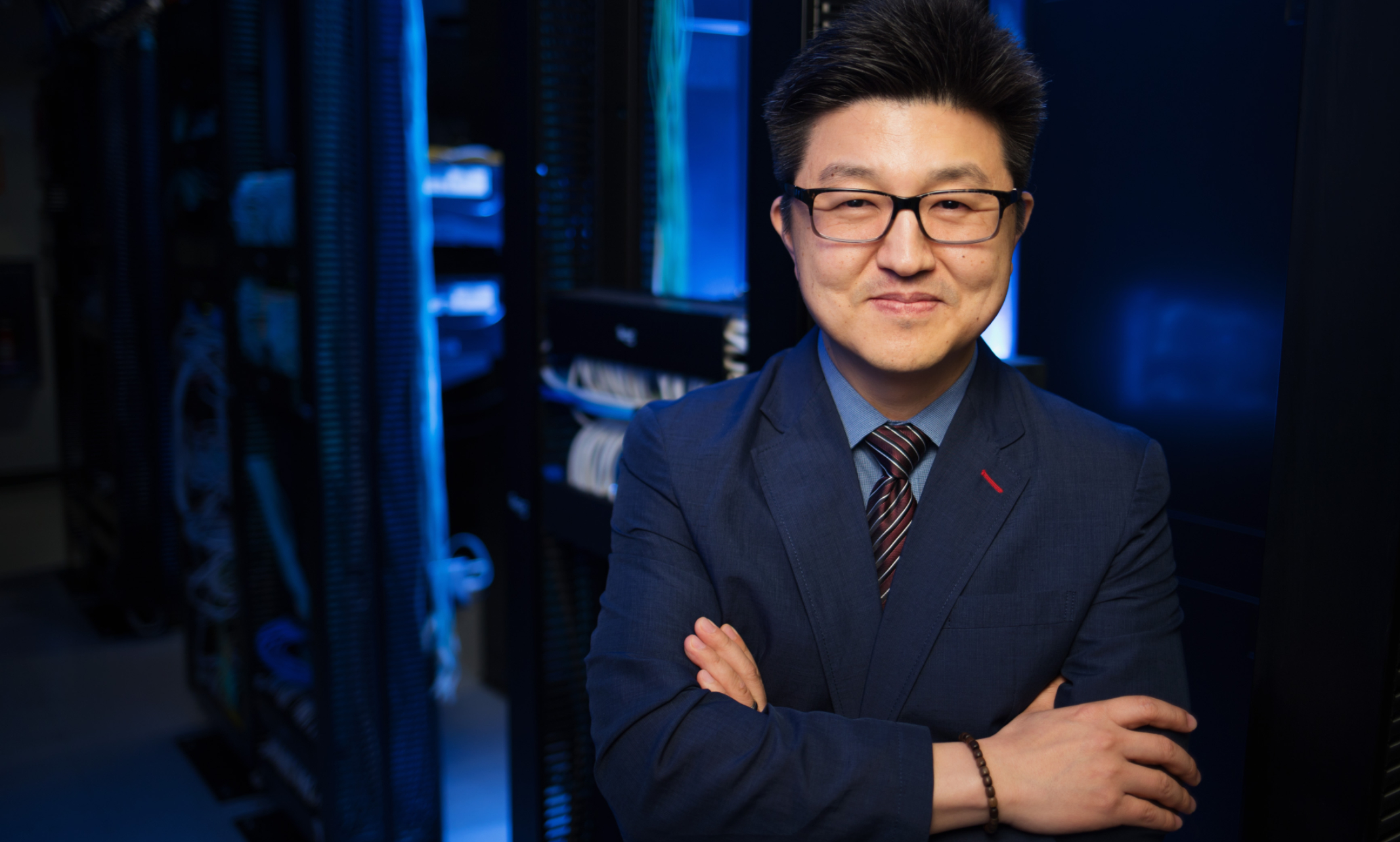
Jungwoo Ryoo receives School of Computing and Engineering Alumni Achievement Award
Each year, the UMKC Alumni Association recognizes the achievements of outstanding alumni with an awards celebration. The UMKC School of Computing and Engineering is honoring Jungwoo Ryoo (B.S. '96, M.S. '98) with its Class of 2022 Alumni Achievement Award.
Jungwoo Ryoo currently serves as the head of the Divison of Business, Engineering and Information Sciences and Technology and Professor of Information Sciences and Technology at Pennsylvania State University-Altoona. Recently, he was named Chancellor and Chief Academic Officer of Penn State DuBois, which he will begin on April 4, 2022.
He received his B.S. ('96) and M.S. ('98) from UMKC before completing his Ph.D. in computer science at the University of Kansas.
His research interests include information security and assurance, software engineering, computer networking and data science. Ryoo is the author of numerous academic articles and conducts extensive research in software security, network/cyber security, security management and auditing, software architectures, object-oriented software development and requirements engineering. Overall, he has received more than $1.5 million in total external funding.
How do you feel you've been able to move the world of computer science forward through your work?
I feel that my contribution to computer science has been making cutting-edge technologies more accessible to both end-users and developers to be at their best in what they do.
My work over the years has evolved from general software engineering to software security. With this narrower focus, it's easier to find problems with real-life consequences. For example, I have conducted two studies funded by the Center for Rural Pennsylvania to assess the cybersecurity readiness of local governments. Another prime example is my work to make it easier to build security into software applications through a methodology like Architectural Analysis for Security.
How did UMKC prepare you for/contribute to your success?
My professors laid a solid foundation for my learning path in computer science. Back in 1994, the name of our program was the Computer Science and Telecommunications Program, which was innovative and ahead of its time.
I gained my knowledge in networking and telecommunications on top of the traditional computer science curriculum, which became really handy when I became more interested in cybersecurity research.
What advice do you have for students who'd like to follow in your footsteps?
My advice would be to try to step out of your comfort zone. If you want to become a better person, you shouldn't be afraid of being uncomfortable with failing fast and often. The key to success is to learn from your failures and keep moving forward.
About Alumni Awards
Join us in honoring Ryoo and the other Class of 2022 awardees at an in-person celebration at 6 p.m. April 29, at the James C. Olson Performing Arts Center. To register, visit UMKC's Alumni Association website. If you are unable to attend the event but would like to donate to student scholarships, contributions can be made online.
Feb 07, 2022
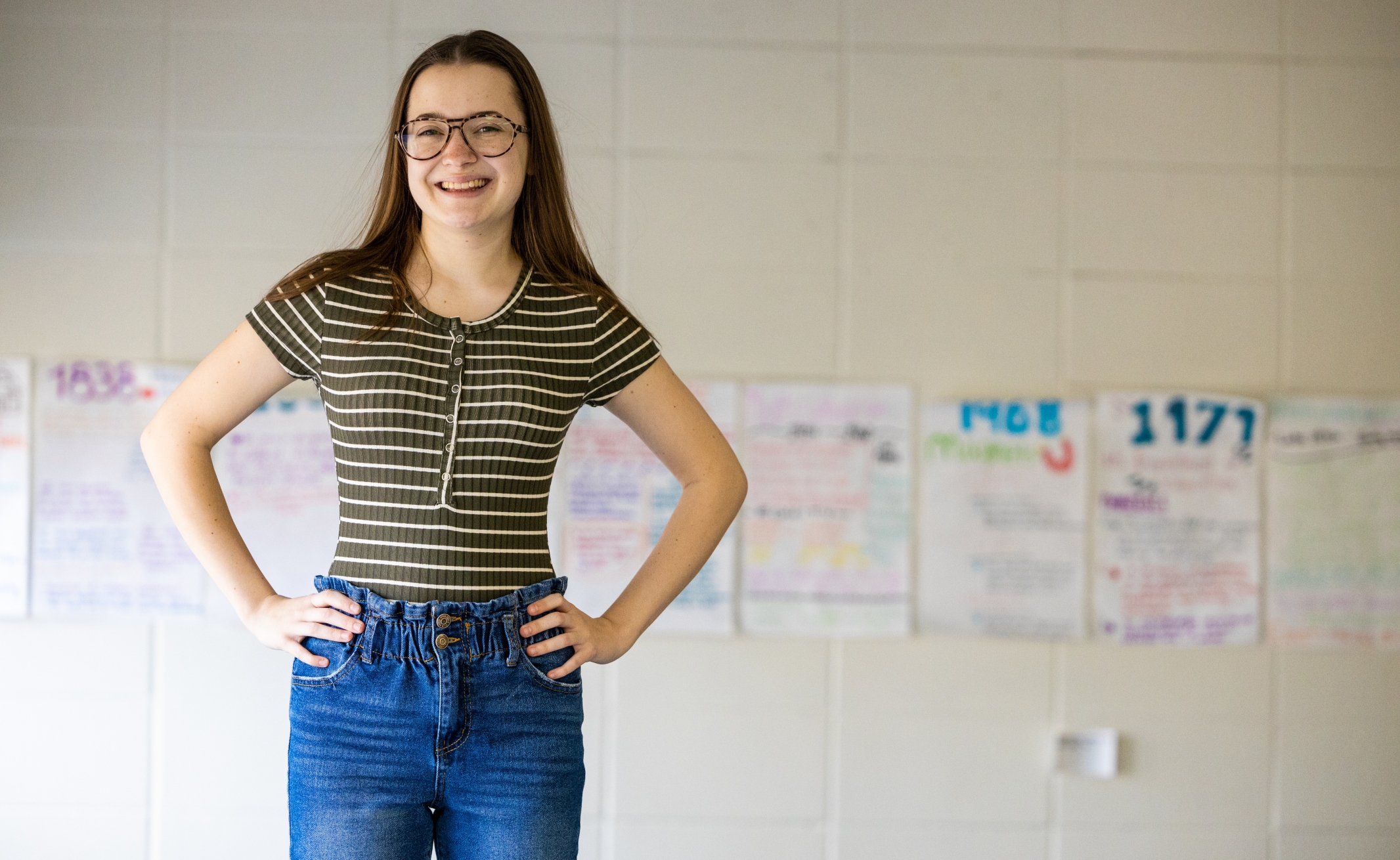
The Grow Your Own program is a catalyst for student success
Roos don’t just dream, they do. Our students turn ideas into action every day. Get to know our people and you’ll know what UMKC is all about.
Audri Sander is building her future in the UMKC School of Education Institute for Urban Education (IUE) Grow Your Own program.
“My principal contacted me over the summer,” Sander says. “We set up a Zoom meeting to talk about IUE. She’s a graduate of the program and she knew I wanted to be a teacher. She thought it would be a good fit.”
Sander’s principal, Kirsten Brown-Persley, BA, ‘12 of Crossroads Preparatory Academy, recommended Sander to the Grow Your Own program, which is sponsored by the IUE in the UMKC School of Education. The program recruits students in diverse high schools and provides college scholarships to help pay for their education degrees when they commit to teach in urban classrooms. Participants have dual credit options while in high school and scholarship opportunities.
“I feel like teaching is such an impactful job. Teachers really have the ability to change lives, and I love that idea.” — Audri Sander
“Audri was always transparent about wanting to be a teacher,” Brown-Persley says. “I knew she would love the program because of her commitment to both social service and education.”
UMKC’s IUE program has a 100% job placement rate following graduation and nearly 90% five-year retention rate of graduates teaching in their chosen schools. Missouri’s overall retention rate is 35%, so the students’ foundation for career success is significant.
“This program has been such a good fit,” Sander says. “I feel like teaching is such an impactful job. Teachers really have the ability to change lives, and I love that idea. Also, I love being around kids. I feed off their energy.”
It’s not just the classes at UMKC that energize Sander. There are thirteen students in her IUE cohort, which has helped her find friends easily during her freshman year. In addition to the coursework related to their majors, IUE students also participate in co-curricular courses and activities.
“I wasn’t sure how long it would take me to get to know the people in my cohort,” she says. “But we just clicked instantly.”
Brown-Persley had a similar experience in IUE.
“I made lifelong friendships in the program,” she says. “I knew Audri would be able to build her network and build skills and experience that will make her an excellent teacher.”
Sander has two main goals – graduate and start teaching immediately.
“One of the objectives of the program is for students to get jobs right away after graduation,” she says. “I’m super excited to get into the classroom and be hands on.”
Sander thinks that teaching will make her feel as if she’s really accomplishing something important.
“While it’s not like I’m in construction, where I can see what I’m accomplishing, I still feel as if I’ll be able to look back from the beginning of the school year and see the progress that I’ve helped students make. That’s really exciting to me.”
Feb 03, 2022
A profile of KC Tenants founder Tara Raghuveer shows how the organization's leader worked with UMKC's Center for Neighborhoods
Raghuveer shared data with Center for Neighborhoods to help address housing access. Jacob Wagner, director of urban studies at UMKC, was also quoted. Read more
Feb 02, 2022
Tony Caruso is an accomplished professor of physics and electrical engineering at UMKC
The Kansas City Business Journal recently wrote that Caruso earned the distinction of being named a Fellow of the National Academy of Inventors, the highest professional distinction awarded to academic inventors. Read more
Feb 02, 2022
